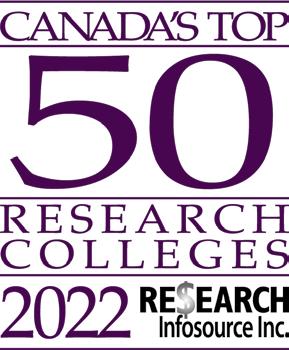READY FOR REAL-WORLD SOLUTIONS

THE 2022-23 REPORT FROM LETHBRIDGE COLLEGE’S CENTRE FOR APPLIED RESEARCH, INNOVATION AND ENTREPRENEURSHIP









THE 2022-23 REPORT FROM LETHBRIDGE COLLEGE’S CENTRE FOR APPLIED RESEARCH, INNOVATION AND ENTREPRENEURSHIP








Since joining Lethbridge College as President and CEO in September 2022, I have been proud of our institution’s expanding role as an impactful applied research centre.
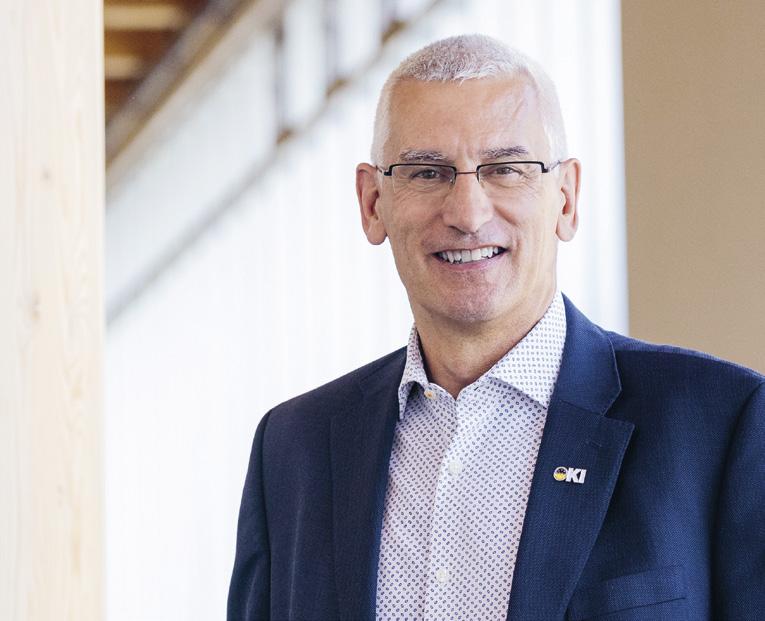
The significant value of the applied research we do at Lethbridge College has farreaching effects, whether it’s ground-breaking research in agriculture and the environment, business and technology, public safety, health and wellness, social sciences or Indigenous knowledge. Our applied research enables economic and social growth at local, provincial and national levels. We serve our community and help industries and sectors become more sustainable, profitable and innovative. This has a ripple effect for our students, who have opportunities to work on real-time, real-world issues in diverse environments. Students extend theoretic concepts from the classroom to produce tangible results in the real world. And in an integrated way, the learnings through applied research are translated back to ensure our curriculum is ever current.
The Centre for Applied Research, Innovation and Entrepreneurship (CARIE) at Lethbridge College provides widespread applied research opportunities and a source of revenue that enables us to continue to build on our capabilities. Our expanding global reputation as an applied research powerhouse is allowing us to attract highly qualified post-doctoral fellows because they see the value in what we’re doing with applied research.
I am proud of the accomplishments that CARIE has made and the impact our research is having on creating solutions to benefit the economic and social needs of our community. I fully believe that Lethbridge College will continue to grow in prominence in the applied research sector, and I am excited to be part of what happens next.
Dr. Brad Donaldson, EdD Lethbridge College President and CEO
In recent years, we have seen accelerated interest and growth in applied research activities at Lethbridge College.







As a result, we have generated a positive impact on our region, province and country. Our industry-led activities align with numerous targets set by our governments to create thriving communities. We’re proud of the role we play in the innovation ecosystem as a driver of economic and social development. A moment of great pride for our team this year was receiving national recognition of our accomplishments. We continue to forge our reputation as one of Canada’s top research colleges, ranking 16th in the annual Research Infosource ranking of Canada’s top 50 research colleges. This is our highest ever appearance in the rankings and the first time we have cracked the top 20. We also ranked fifth in research income growth – the third straight year that we have been recognized as one of the country’s 10 fastest-growing research colleges.
Expanding our research infrastructure to support our researchers’ work is critical in specific areas of expertise. We are particularly proud to be ranked first in the country in funding received from the Canadian Foundation for Innovation (CFI), a non-profit corporation that invests in research infrastructure. The high level of CFI funding is indicative of a growing operation, as infrastructure is put in place to support future research projects. The stories in this report speak to our dedication to becoming stronger ecosystem partners with state-of-the-art research facilities and highly qualified research experts and technical staff.
Dr. Kenny Corscadden, PhD, MBA, PEng, FIET Vice President, Research and Partnerships
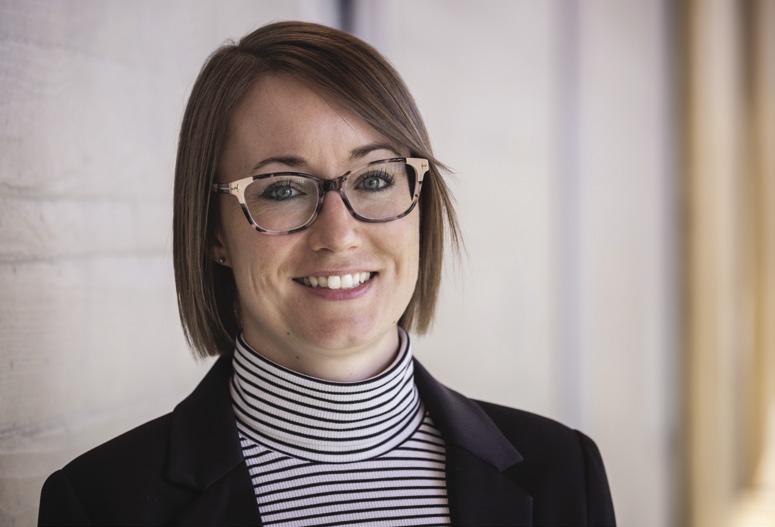
The stories in this sixth edition of our annual applied research report speak to the deep connection we feel with our work, our community and the role of applied research in the innovation ecosystem.
As I walk through our college’s applied research facilities and meet with our teams, I often find myself marvelling at all we’ve built over the last few years – all of it industry-driven for sustainable economic, environmental and social impact. The irrigation research farm, the grain drying site, the new labs, our spatial technologies studios, all address specific needs and offer incredible potential for supporting a sustainable future. I find my heart full of pride and gratitude for our team’s hard work and the support we receive from inside and outside the institution.
Our first story speaks to the college’s commitment to truth and reconciliation, and in particular, how CARIE activities align with the college’s Niitsitapi Strategy. The concept of Kakyoskin (the Blackfoot term for “coming to know”) resonates deeply for me, personally. Every day in this job I have the great privilege to learn, to sit in humbled awe at all I don’t yet know and to strive to make a difference in our world. The opportunity to participate in Kakyoskin has granted me reflective moments and camaraderie and the opportunity to consider my actions through a holistic lens.

I hope you enjoy reading the stories of our past year as much as we enjoy compiling them.
Megan Shapka, MEd Director, Applied Research OperationsLethbridge College is located on the traditional lands of the Blackfoot Confederacy. As such, Lethbridge College is committed to honouring the land from a place of knowing. Our college’s Blackfoot name is Ohkotoki’aahkkoiyiiniimaan, which means Stone Pipe. The offering of a stone pipe is a promise or a peace bond made with the honesty and integrity needed to fulfill the commitment. This strategy is our promise to our students, our college community and all Indigenous communities. We honour the Siksikaitsitapi as both the traditional and current Land Keepers of this area, and we welcome all First Nations, Métis, Inuit and non-Indigenous peoples who call Blackfoot territory their home.
The Centre for Applied Research, Innovation and Entrepreneurship (CARIE) collaborates with industries, community organizations, researchers and students on applied research projects aimed at solving real-world challenges with immediate practical applications.
The 2022-23 CARIE Report highlights some of the innovative applied research projects underway at Lethbridge College.
Lethbridge College leaders are discovering new ways of learning and exploring traditional Indigenous ways of knowing. In 2023, Lethbridge College formed Kakyosin (“coming to know” in Blackfoot), which is an Indigenous-Informed Research Committee tasked with developing research protocols based on traditional Indigenous methodologies.
Lowell Yellowhorn, Indigenous Services Manager, says the group’s name, Kakyosin, suits its purpose. He says, “When you put that word into context in English, it is essentially defined as ‘coming to a place of knowing,’ so that really fits with the college’s research mandate. That’s why we chose Kakyosin. That’s what it entails. We really are coming to a place of knowing, in a good way.”
The Kakyosin initiative is focused on incorporating Indigenous ways of knowing into the college’s applied research projects through the Centre for Applied Research, Innovation and Entrepreneurship (CARIE). The committee is comprised of 15 internal and external partners who are learning from each other and expanding their understanding of Indigenous-informed research protocols and methodologies.
“It underpins everything,” says Dave McMurray, Manager, Applied Research Operations. “It’s about developing those principles and protocols for engaging with Indigenous communities in research. It isn’t just in one area of applied research; it’s institutional, so it ties back to the Niitsitapi Strategy.”
The creation of the Kakyosin committee was a natural progression of the Niitsitapi Strategy, which is a commitment to truth and reconciliation at Lethbridge College. The Niitsitapi Strategy guides the college toward an understanding of the cultural perspectives of Indigenous peoples and communities. It is focused on Indigenous cultural inclusion and deepening connections with internal and external Indigenous communities. The goal of the strategy is to ensure the college community can come together for inclusive, diverse, engaged and successful education. This strategy is not the start of that work, but rather, it is an extension and continuation of work the college has been doing for many years.
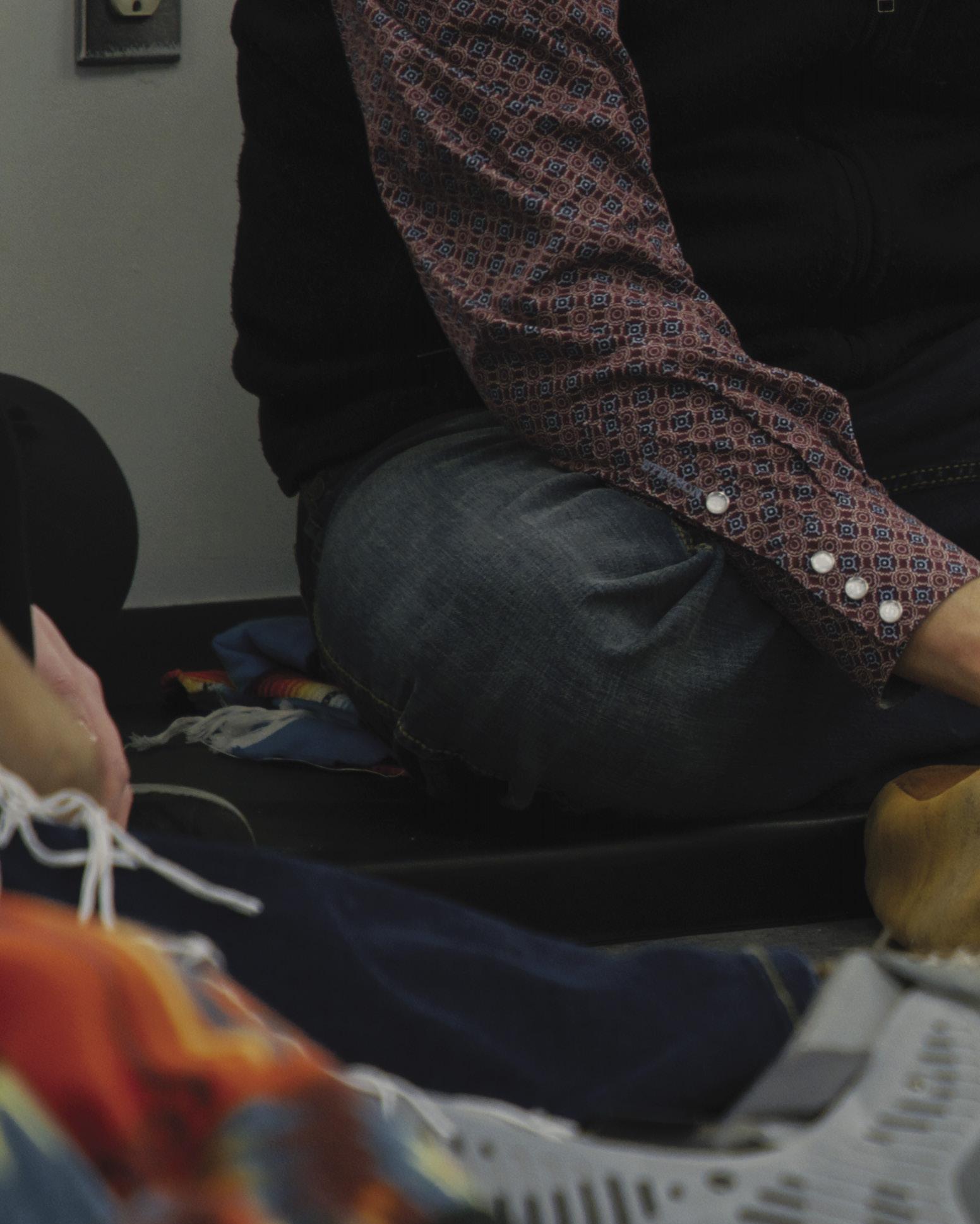
The Kakyosin committee discovers Indigenous ways of knowing through traditional practices, such as pipe ceremonies and smudges.

“We’re viewed as leaders in reconciliation in the post-secondary environment here in Canada,” says Yellowhorn. “We want to honour the truth and reconciliation calls to action. We want to respect our roles when it comes to other postsecondary initiatives like Indigenous education protocols and the seven guided principles, like foundational Indigenous education and approaches to Indigenous education. So, that’s what it comes down to, is helping and assisting Indigenous learners and communities in the advancement of post-secondary education.”
The Niitsitapi Strategy identifies five overarching themes: governance and community; Indigenous students; curriculum and pedagogy; collective environment; and research and innovation. Each theme has identified focus areas and priority outcomes that ensure the college is working toward making Indigenous education a priority, and Kakyosin aims to address the theme of research and innovation.
“Kakyosin will be based on transparency and learning, to ensure the research benefits everyone,” says Dr. Kirsten Fantazir, Lethbridge College’s President’s Applied Research Chair in Public Safety. “We’re trying to set the groundwork so that we have co-created protocols, procedures and policies to inform research teams and our partners, and we want that to be the lens that all Indigenous research is based on. For any projects that involve Indigenous organizations, groups or people, researchers and teams will abide by these guidelines so we’re conducting research in a respectful and meaningful way.”
The Kakyosin initiative also connects to the Buffalo Treaty – which Lethbridge College was the first Canadian college to sign, in March 2023 – as the goals of that treaty include supporting Indigenous education and research.
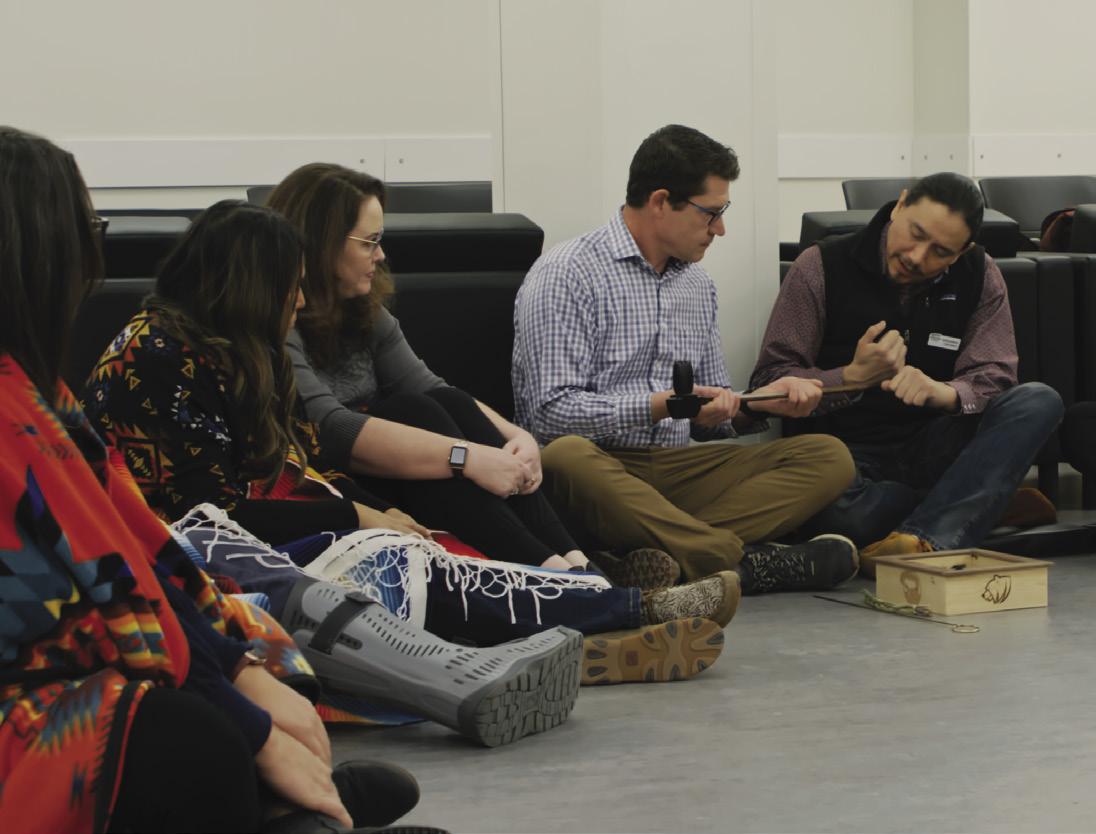
Yellowhorn says, “Lethbridge College is in a unique environment when it comes to the post-secondary landscape because we border some of the largest First Nations in Canada. How are we holding ourselves accountable to those communities that we serve? They have long-standing post-secondary traditions with Lethbridge College. A lot of members of those communities get their start in postsecondary education here in this institution. So, it’s recognizing that this institution is helping to drive the Blackfoot communities forward. A lot of innovation comes from this institution in those communities and drives the Indigenous political landscape in Canada as well as internationally.”
The Kakyosin group, led by Indigenous knowledge keepers, is instrumental in ensuring First Nations’ Ownership, Control, Access and Possession (OCAP) and Findability, Accessibility, Interoperability and Reuse (FAIR) principles are honoured in research partnerships, projects, and knowledge dissemination opportunities.
This knowledge isn’t learned in the same way as most post-secondary educational methods. This learning, exploring, discovery and understanding comes in the form of traditional gatherings, such as pipe ceremonies, smudges and other Indigenous practices.
“We honour and learn from each other in a setting informed by Indigenous tradition and ceremony, and authentic discussions transpire as a result,” says Fantazir.
Yellowhorn adds, “We have come a long way. There have been a lot of challenges over the years that have impacted the way we relate to one another. It shows that the Niitsitapi Way of Life has meaning and importance.”
Indigenous Elder and Grandparent Peter Weasel Moccasin is involved in educating and
Peter Weasel Moccasin (Miiniipooka)
Indigenous Elder – Grandparent
collaborating with the Kakyosin committee through stories and traditional ceremonies. He says, “The stories have value. They will teach us and remind us of the values that come from it. The teachings come from the past. If you want to call them laws, that’s what we still believe in, and they help us face challenges. Now we have communication, and everything comes from that. Whatever was passed on from
the past, we’re still practising today. This is where we come in; men like myself, or women who have the knowledge, have the wisdom to be able to share the teachings in a good way, so that people can have an understanding of it. Written things are OK, but the stories that come from us and the language make a big difference. Maybe there will be something there to help them, or exchange, whatever will help them overcome their challenge.”
When it comes to helping with research challenges, the Kakyosin committee has been gathering valuable Indigenous knowledge since its inception last year, and Indigenous methodologies are already being incorporated into applied research projects across the college. Some of these Indigenous-informed research projects will be highlighted within the pages of this report, and more applied research projects will incorporate the knowledge shared by the Kakyosin committee in the years to come.
Manager – Indigenous Services
Spiitawakasi is a Siksikaitsitapi (Blackfoot Confederacy) member of the Piikani Nation. He has been embedded in the cultural ways of his people and has served his community in various capacities throughout his journey, ranging from leadership to cultural practice. He is a valuable member of the Kakyosin committee and the Indigenous Services team at Lethbridge College.

Indigenous Elder – Grandparent, Indigenous Services
Peter Weasel Moccasin has worked as the college’s Kainai Kaahsinnoonik (Grandparent) since 2013. He is a mentor, leader and advocate for Indigenous and non-Indigenous students, employees and community members. He is described as a kind, warm-hearted and humble man, and these characteristics earn the respect of those around him. He is an important member of the Kakyosin committee, and he brings a wealth of valuable traditional knowledge to the group and helps other members of the college community understand Indigenous culture, methodologies and ways of knowing. Weasel Moccasin is a proud member of the Kainai Nation and a knowledgeable representative of the Blackfoot culture.

“The stories have value. They will teach us and remind us of the values that come from it. The teachings come from the past.”

The Lethbridge College Centre for Public Safety Applied Research (CPSAR) has a clear vision: to improve public safety. CPSAR does this by mobilizing partnerships with Canadian public safety agencies, community organizations and youth programs through collaboration and innovation to promote evidence-based policies and practices.
CPSAR launched in 2022, aiming to work closely with policing, court, corrections, community support services and youth organizations to enhance public safety and engagement. It is one of the only applied research centres of its kind in Western Canada that derives research initiatives from partners directly with the goal of providing practical solutions.
Building on over 54 years of criminal justice education and training at Lethbridge College, CPSAR’s foundation is built upon a rich history that is supported by meaningful industry relationships necessary to address the complex, interrelated challenges faced by communities today.
“We’re filling a gap that was needed in applied research,” says Dave McMurray, Manager, Applied Research Operations. “We are responding to what public safety organizations have shared as their challenges.”
Dr. Kirsten Fantazir, Lethbridge College’s President’s Applied Research Chair in Public Safety, says, “We have accomplished a lot in a year because our team has built rapport and stayed connected with our industry and community partners. We are fortunate to have alumni across Canada and into the U.S., so as a result, many of our partnerships stem from former diploma or degree students, and some of our research collaborations are with former police recruits who took their training at Lethbridge College. In addition, our program has hosted semi-annual networking events for students over the past 15 years, so many of our formal research partnerships grew from these connections.”
The Centre for Public Safety Applied Research (CPSAR) aims to increase youth and community engagement in public safety through applied research.

CPSAR formally collaborates with more than 26 public safety partners across Canada including policing, correctional and court services, educational institutions, research labs and centres, community organizations and technology companies.
CPSAR’s research themes and projects are also rooted in the spirit of reconciliation with an emphasis on collaborating with Blackfoot and other Indigenous Peoples to share knowledge. As such, Indigenous-informed research approaches, perspectives, representation and/or scenarios are incorporated into CPSAR applied research projects.
“Indigenous research, or the Kakyosin (Blackfoot for “coming to know”) theme, is something that’s an undercurrent in many projects,” says Fantazir. “We’re using Indigenous methodologies where they are appropriate, and we’re working with Indigenous researchers and scholars to determine what those methodologies should be, and when and how they should be used. What we’re doing institutionally in the Kakyosin will inform future applied research projects.”
In 2022, CPSAR was awarded the largest social sciences research grant in Lethbridge College’s history through the Natural Sciences
and Engineering Research Council of Canada (NSERC) and the Social Sciences and Humanities Research Council (SSHRC). With $1 million from the Mobilize Grant program (2022-2027), CPSAR initiated seven applied research projects that involve 14 Lethbridge College faculty members, seven student researchers, two student extended reality (XR) software developers and more than 600 Lethbridge College students. These numbers will continue to grow over the next five years as additional applied research projects are launched.
“CPSAR is set up to solve the real-world problems and challenges that are being experienced in public safety and communities today,” says Fantazir. “The intent is really to enhance or to help the community because it is community-based research. At the end of the day, we encourage collaboration among our partners, so the results and impacts are multifaceted and meaningful to our community.”
CPSAR applied research projects underway at the college explore crime prevention strategies, offender reintegration, the reduction of gender-based violence in youth, identity formation of police recruits, youth engagement strategies, and the application of immersive technologies for public safety recruitment, assessment and training. Since all CPSAR projects involve partnerships with public safety and community organizations from across Canada, Lethbridge College students are benefiting from experiential learning opportunities through proposing, supporting, and even conducting research in collaboration with these industry partners.
“Applied research is a vital piece of our centre and programs,” says Trudi Mason, Dean, Centre for Justice and Human Services. “It creates strong relationships with our industry partners, supports professional development for our faculty, and, most importantly, provides valuable experiences and learning opportunities for our students.”
Some of the CPSAR applied research projects underway are outlined on the following pages.
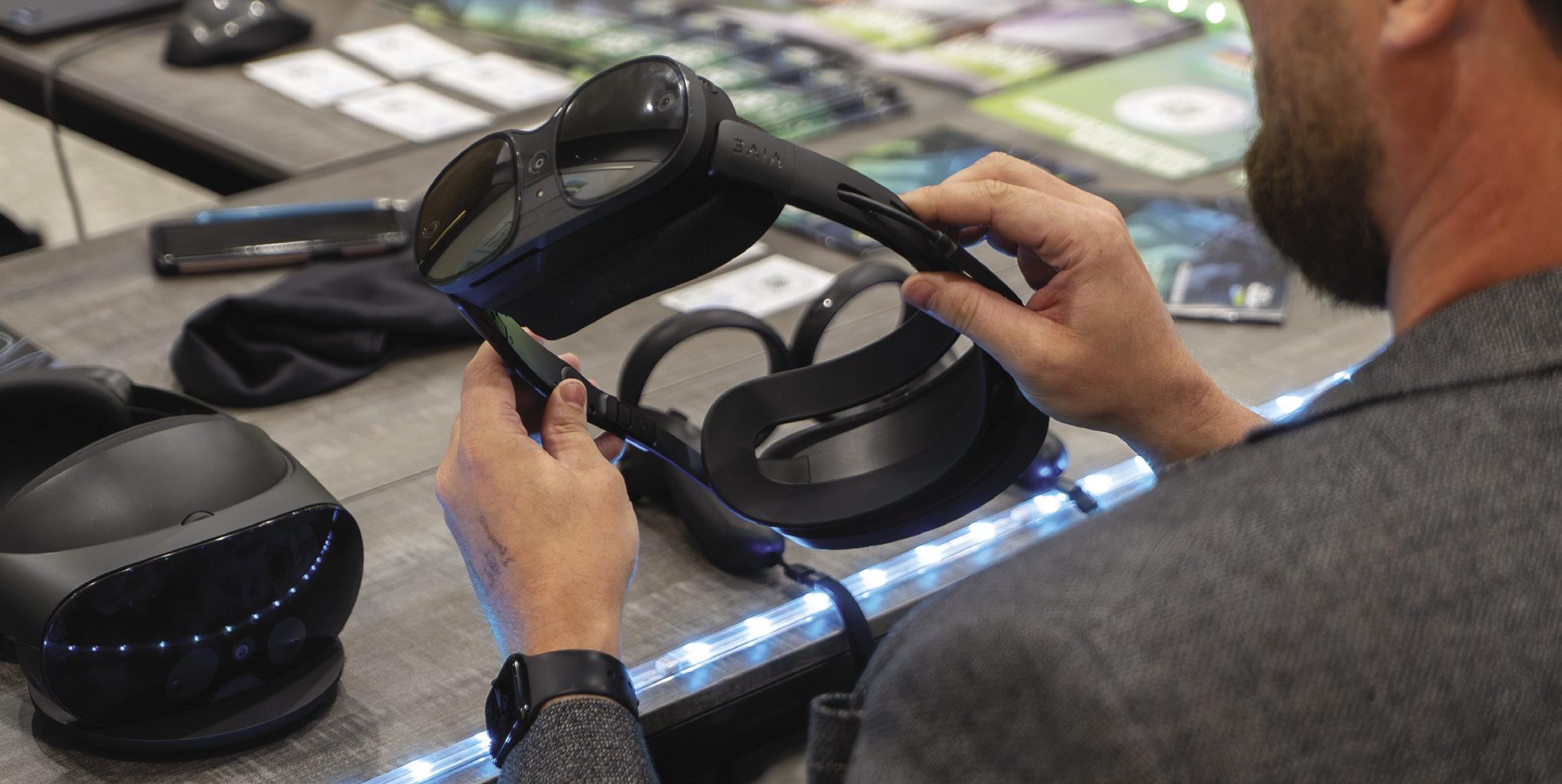
Ethical decision-making is crucial in public safety. Policing agencies have struggled with assessing applicants, recruits and front-line staff on reasoning strategies and response patterns related to ethical decision-making abilities. Standard methods of assessing the decisionmaking capabilities of applicants in public safety often rely on subjective and unvalidated approaches, such as conducting behavioural descriptive interviews with applicants. Many of these current tools are flawed, so this applied research project aims to determine if using virtual reality (VR) and immersive simulation scenarios can improve hiring processes and measure a potential officer’s ability to make ethical decisions.
Seven police agencies and communitybased partners from British Columbia, Alberta, Manitoba and Ontario are working on this project with Fantazir and fellow Lethbridge College researchers Mike McCready, Industry Liaison and Research Advisor for the college’s Spatial Technologies Applied Research and Training (START) Centre, and Dave Maze, instructor with the School of Justice Studies.
Maze says, “Scenario-based training allows us to easily recreate real-world situations
and environments that are not possible to replicate elsewhere.”
An experienced VR developer will work with public safety industry partners, the research team from CPSAR, a student research assistant, and current VR students (junior developers) to create a scenario with event-driven behaviours. This scenario will serve as a proof of concept to enhance and facilitate objectivity in the application process. It will also potentially be used as an example of how VR can be leveraged in the future for public safety recruiting and training purposes.
“I think this gives us a chance to give scenarios that Brandon may face, and learn scenarios that other agencies may face, so we can combine this learning, and that’s all part of the research, finding the best way forward,” says Wayne Balcaen, Chief of Police, Brandon Police Service (Lethbridge College Criminal Justice - Policing 1990). “It’s certainly a win-win all around for both Lethbridge College as well as the police agencies that are going to be involved.”
Fantazir adds, “Improving police applicant processes by integrating objective assessment of ethical decision-making abilities leads to safer communities, greater transparency in hiring processes and enhanced relationships between the public and law enforcement.”
When is it appropriate for police officers to use deadly force? The answer is subjective depending on the role someone plays in any given situation. In a hostage scenario, for example, you might have a different opinion on deadly force depending on whether you are a hostage, a hostage-taker, a police officer, a witness, or simply watching the incident unfold on TV or social media. Your preconceptions about police may also play a role in your opinion.
The primary goal of this study is to understand how deadly threat situations are perceived by people. This applied research project aims to understand whether the target of a deadly threat (a hostage or a police officer being threatened by a suspect, for example) influences whether responding officers use deadly force, and also whether people in general think officers should use deadly force against a suspect. A secondary goal of this research is to examine how individual perceptions and opinions influence these results.
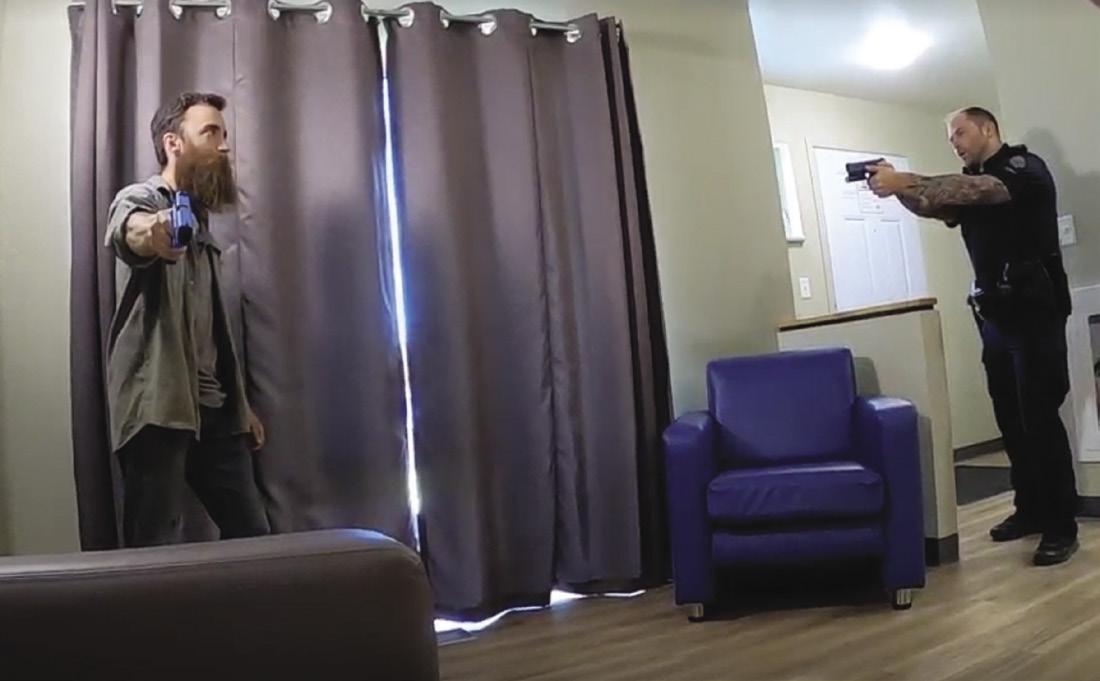
Fantazir is leading this CPSAR applied research project in collaboration with the Royal Canadian Mounted Police (RCMP), Carleton University’s Police Research Lab, and the Medicine Hat Police Service.
Dr. Craig Bennell, Director of Police Research Lab at Carleton University, says, “This study represents an excellent example of collaboration between organizations and individuals. Only by bringing together academic researchers, police professionals and audiovisual specialists – from Lethbridge College, Carleton University and various police services – have we been able to develop realistic study scenarios and recruit the necessary participants to address the important, applied research questions.”
Kevin Cyr, Officer in Charge, RCMP Lower Mainland Emergency Response Team, adds, “This research will provide important insight into what use-of-force decisions police officers make, and how quickly they make them, in different circumstances. This study will also overlay how civilians believe police officers should make use-of-force decisions given the same set of circumstances, albeit from a bystander and hostage perspective. The juxtaposition of these data sets will allow a direct comparison of police officer decisionmaking against public expectations.”
Beyond providing insights into these issues, the results of this applied research project may have training and policy implications for police services across Canada.
“This study represents an excellent example of collaboration between organizations and individuals.”
Dr. Craig Bennell Director of Police Research Lab at Carleton University
Negative interactions between police officers and the public can significantly impact the trust people have in community police services. Enforcement agencies struggle to use nonviolent techniques and strategies to de-escalate intense situations, especially those incidents involving people with mental illness.
Specialized training for these types of situations can be challenging. That’s why police services across Canada are exploring the use of 360° video and artificial intelligence (AI) scenario-based environments to enhance the training of police officers and recruits who face crises and other incidents where de-escalation skills are critical.
“Public safety agencies are turning to immersive digital environments for training because the technology is cost-effective, allows for quick deployment, improves the quality of training, is replicable, offers mistake-tolerant opportunities, reduces stress on the user, and prepares public safety personnel for real-life interactions to build higher stress resiliency of frontline personnel. Our approach allows public safety agencies to better assess and prepare their personnel for improved interactions with citizens in numerous situations,” says Dave Maze, an instructor with the School of Justice Studies at Lethbridge College.
Maze and fellow instructors Stephen Graham with Computer Information Technology and George Gallant with Media and Information Technology, are working with public safety and community partners from across the country
on this applied research. The project involves developing a proof-of-concept product as an immersive AI language-to-text scenario-based experience. It uses 360° video embedded in 3D environments to demonstrate de-escalation tactics for mental health calls and other interactions to be used for training cadets, applicants and front-line personnel.
Maze says, “There are numerous advantages to leveraging immersive video and AI technology for training. Users can practise communication and other skills that are required in their daily activities in a safe environment. Their interactions within a 360° video scenario can be recorded and used for self-reflection, assessment, and individualized training needs specific to that user. AI language-to-text capabilities allow us to create seamless interactions that are immediately responsive to the user’s verbal interactions, which creates a sense of ‘presence’ for the user and thus enhances the learning experience.”
The goal of this applied research project is to reduce the number of negative interactions between police officers and people living with mental health issues. Research outcomes will help police officers learn de-escalation skills, understand human cognition, and better respond to intense situations, resulting in better communication and improved relationships between front-line officers and members of the community.
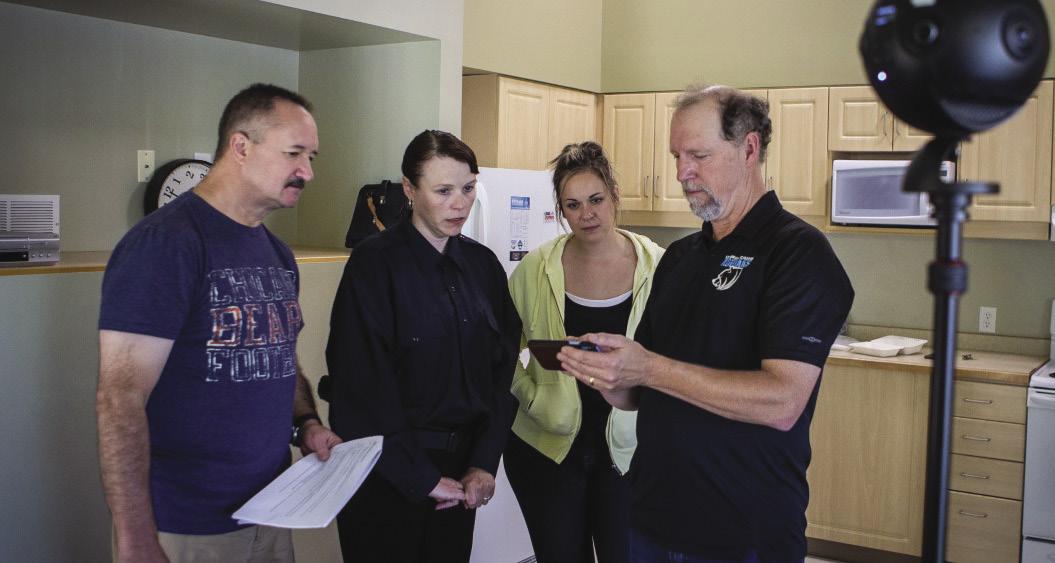
“Users can practise communication and other skills that are required in their daily activities in a safe environment.”
Dave Maze Instructor, School of Justice Studies
When new police recruits make the transition from being regular civilians to being sworn members of a police organization, they undergo a process of identity formation and perspective development. It’s an intensely personal process that can be enhanced by the development of new job-related skills and other factors. By studying the process of socialization and integration, researchers can see how new recruits’ experiences and their interpretation of their role can affect their choice to stay in the job. Researchers also hope to gain insights on how recruits come to internalize their developing identity and understand the requirements of their police work.
Dr. Jim Urasaki, an instructor with the School of Justice Studies at Lethbridge College, is taking on this qualitative research project to analyze how police recruits develop their perspectives about the nature of their work and membership in a police organization.
“Police agencies have a continued challenge of recruiting and retaining new members,” says Urasaki. “The study will explore the transition of police recruits into their new roles as police officers, and it may also inform the development of strategies for municipal police agencies to recruit, retain and manage their members.”
Through small group and one-on-one interviews with police recruits, Urasaki will document the data collection using recorded audio interviews, which will then be transcribed and coded. The coding process will determine whether common characteristics exist between research participants regarding their perspective development.
The project findings will provide insight on the process of perspective development for newly hired police officers working in a municipal agency, which could inform approaches to policing in other jurisdictions.
New police recruits go through an intense process of identity and perspective development.

“The study will explore the transition of police recruits into their new roles as police officers, and it may also inform the development of strategies for municipal police agencies to recruit, retain and manage their members.”
Dr. Jim Urasaki Instructor, School of Justice Studies
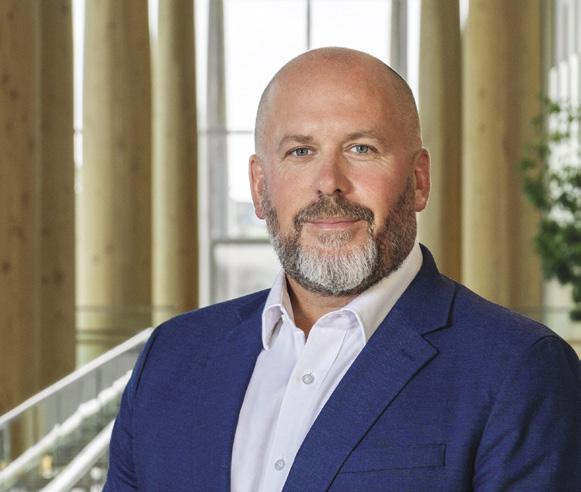

Most Canadian police services, courts and corrections agencies struggle with recruitment. Some police services have developed youth cadet engagement programs to encourage recruitment and help build community engagement. However, few youth cadet programs have been evaluated and assessed on their effectiveness. This applied research project examines the impact of existing youth engagement programs on public safety recruitment and identifies how programs can evolve to improve career outcomes.
Researchers use immersive simulation technology to represent various demographics interacting in day-in-the-life scenarios for youth between the ages of eight and 14. The main purpose is to foster student involvement and examine the youth cadet programs that currently exist in Western Canada. Secondly, this research aims to review and combine the information on youth engagement strategies used in public safety. Thirdly, the research team endeavours to determine what strengths, challenges and opportunities exist in current youth cadet programs that can be supported, strengthened and adapted by other public safety agencies.
Several public safety partner agencies from British Columbia, Alberta, Saskatchewan and
Manitoba are working on this project with lead researchers Dean Kolebaba (left) and Gord Ryall (right), both instructors with the School of Justice Studies.
Brandon Police Chief Wayne Balcaen (Criminal Justice - Policing 1990) is working on this project with the college researchers. He says, “In today’s era of policing and public safety, it is paramount that research-driven solutions are the hallmark of future actions taken by police and programs developed within our service. Data-driven research leads to informed systemic changes that will establish best practices in our profession. I am proud to support the partnership for this significant investment both as an alumnus of Lethbridge College and a Chief of Police.”
The results of this applied research project will provide direction for small- to medium-sized public safety agencies that plan to implement their own youth cadet programs to attract more youth into the field of public safety in Canada.
“In today’s era of policing and public safety, it is paramount that research-driven solutions are the hallmark of future actions taken by police and programs developed within our service. Data-driven research leads to informed systemic changes that will establish best practices in our profession.”
Wayne Balcaen
Chief of Police for the Brandon Police Service
Criminal Justice - Policing 1990
A growing number of business leaders are exploring the possibilities of extended reality (XR), which includes virtual reality (VR) and augmented reality (AR) application systems. Multiple industries are integrating these applications into their operations to enhance employee safety, improve business process efficiency and reduce costs. However, many organizations lack the expertise and the equipment necessary to follow through on their corporate vision or to even conceptualize the use of immersive applications.
Lethbridge College’s Spatial Technologies Applied Research and Training (START) Centre addresses these industry needs through dedicated, industry-focused expertise and equipment.

“Spatial technologies are connecting people, places and objects in new ways, allowing for authentic and enriching experiences,” says Dr. Kenny Corscadden, Vice President, Research and Partnerships, Lethbridge College. “Utilizing novel equipment and specialized expertise, START is driving opportunities for industry to adopt emerging spatial technologies. Our services help companies validate ideas and improve processes while reducing the risks associated with technology adoption.”
START makes it possible for organizations throughout Alberta to accelerate the development and application of immersive and spatial technologies through applied research, development, consulting, training, education and technical services.
“START functions as an Alberta hub for connecting clients and developing capacity within the burgeoning space of immersive technologies,” says Megan Shapka, Director of Applied Research Operations.
“We’re on the cusp of another computing revolution,” adds Mike McCready, START Industry Liaison and Research Advisor. “We strive to help Alberta organizations prepare for this revolution through education, research and consultation. We aren’t responding to these changes; we’re driving opportunities, helping to position Canada as a leader in spatial technologies.”
The START Centre’s state-of-the-art motion capture studio provides digital media production capabilities to multiple industries.
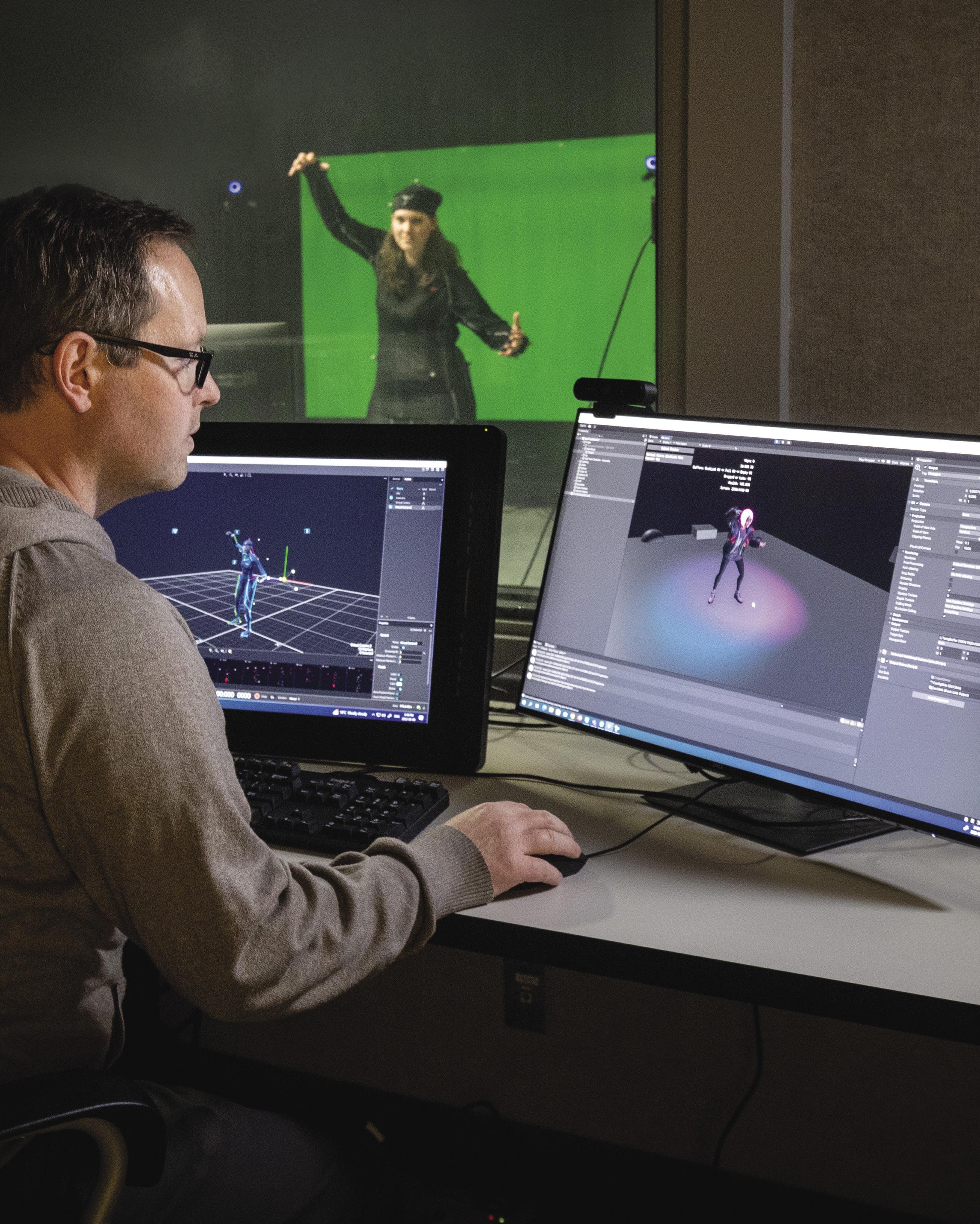
The START Centre celebrated its grand opening at Lethbridge College in March 2023 as part of a Research in RINSA networking event aimed at increasing awareness of the research expertise within the Regional Innovation Network of Southern Alberta (RINSA).
As part of the college’s Centre for Applied Research, Innovation and Entrepreneurship (CARIE), the START Centre has already partnered with several organizations in Alberta and beyond in key sectors including agriculture, energy, architecture, health care, cultural heritage and emergency response.
“How we connect, conduct business and learn is changing,” says McCready. “With our cutting-edge equipment, talented researchers and technicians, and our industry partnerships, START is positioned to support Alberta organizations from across all sectors.”
START assists companies and entrepreneurs in several areas, such as: developing prototypes that can be scaled to commercialization; quality assurance and validation of XR and gaming applications; access to state-of-the-
art equipment including motion capture and photogrammetry; and technical training and expertise.
Even prior to opening the START Centre, the START team had already helped industry partners apply VR and AR technologies and real-time 3D to solve business challenges, including a Health and Wellness research project that used motion capture and animation to create realistic behaviour aimed at promoting self-efficacy for dementia caregivers. Another recent START project involved the ENMAX Energy training pilot module featured on page 35 of this CARIE report.
Tyler Heaton, Industry Liaison and Research Advisor for the START Centre, says, “Virtual reality technology is accessible and cost-effective. It offers the ability to experience situations or scenarios that would be otherwise impossible, unfeasible, dangerous or cost-prohibitive.”
START’s cutting-edge equipment, like the Infinadeck omnidirectional VR treadmill, which is the first model in Canada, has uses across
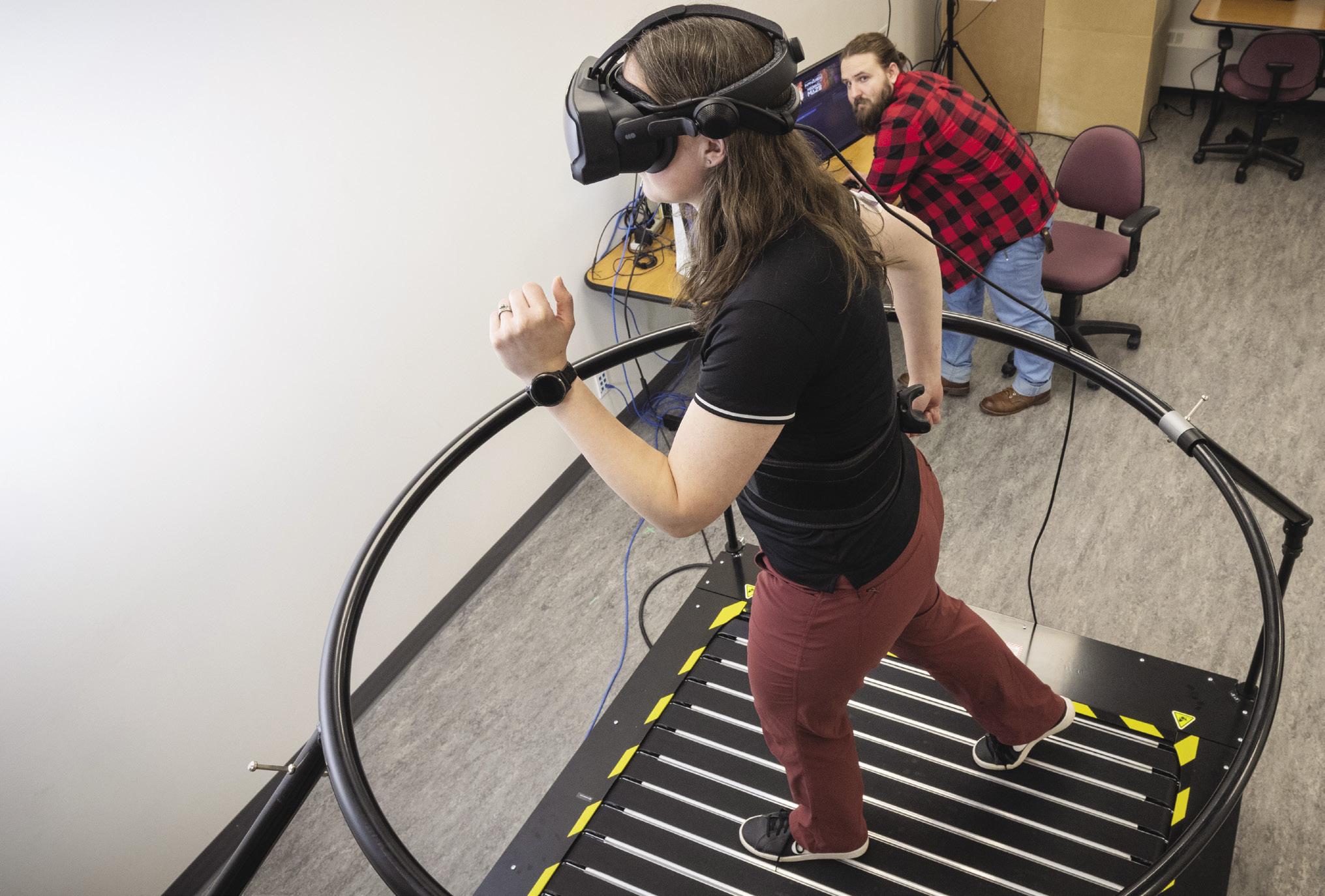
various sectors, including health care, law enforcement, architecture, construction and fitness research. Other Infinadeck clients include NASA, the U.S. Food and Drug Administration, and the U.S. military.
Industry partner, Infinadeck, is excited about its collaboration with the college. “The launch of the START Centre further cements the reputation of Lethbridge College as one of the leading players in the field of spatial technology applied research and training across North America,” says Phil Martin, Chief Revenue Officer, Infinadeck. “Infinadeck is delighted that our omnidirectional naturalgait XR movement platform will form a key component of Mike McCready and team’s cutting-edge work on solving real-world problems using spatial technologies.
“Infinadeck brings true ‘dynamic presence’ into digital experiences by significantly heightening perceptions of embodiment and immersion,” Martin adds, “and we look forward to collaborating with Lethbridge College on seamlessly integrating the mechanics of movement and observation into VR/AR applications to offer enterprises huge gains across knowledge retention, productivity, safety, engagement, training effectiveness and skills acquisition.”
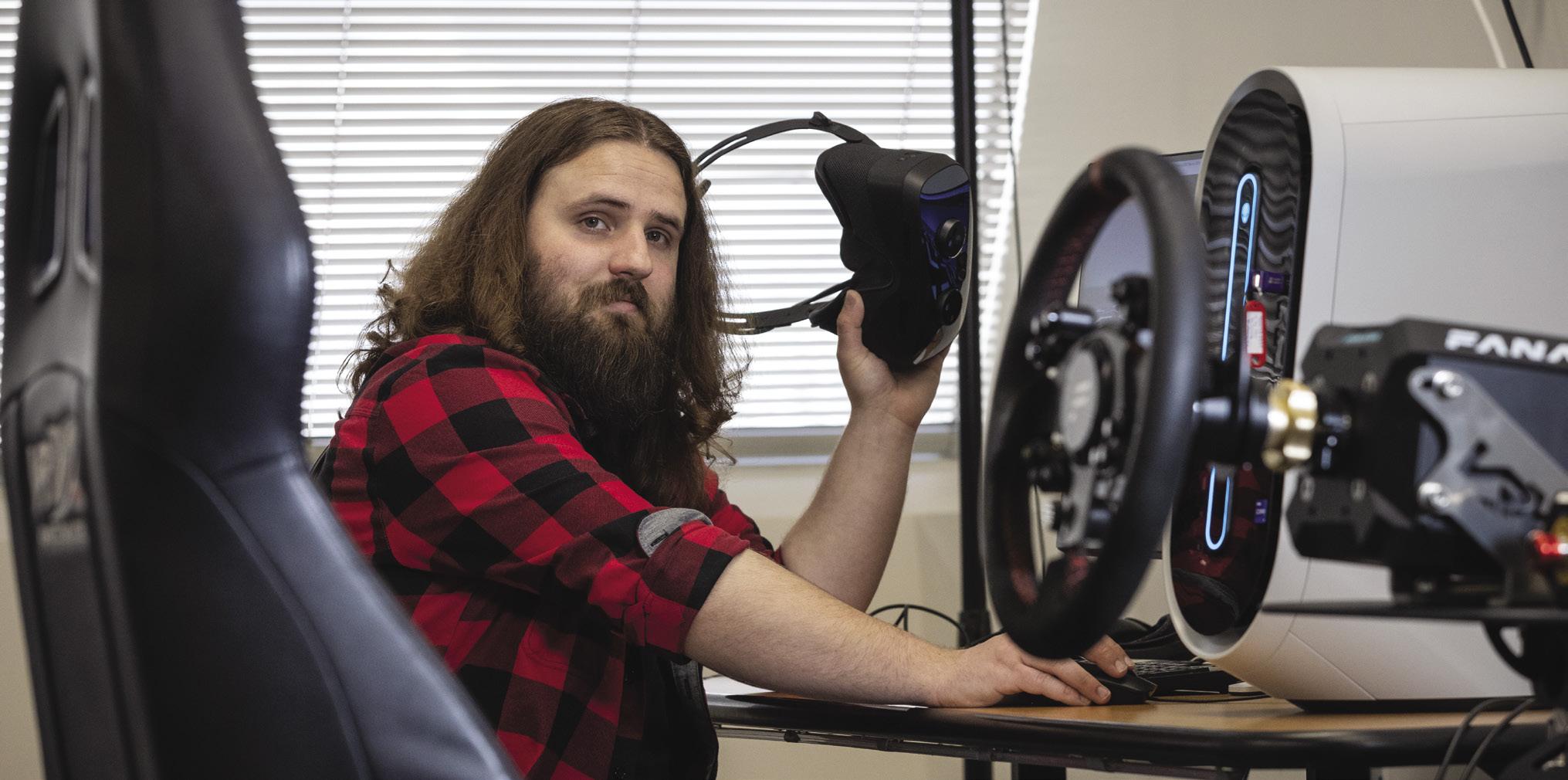
A prototype research VR driving simulator is also being used to develop an immersive driving training solution for partnering police services. Officers will be able to apply effective decision-making when driving in high-speed emergency situations in a simulated and safe environment. Similar START projects involve VR training scenarios for high-risk procedures like industrial plant maintenance and breakdown protocols.
Heaton says, “Interactive experiences that are sensorily immersive can feel incredibly real, resulting in positive benefits like muscle memory, situational awareness, advocacy, self-efficacy and entertainment. Real-time 3D applications will have a large impact on the
The START Centre’s VR driving simulator is being used to develop immersive driver training scenarios for police services and industrial plant maintenance protocols.“It offers the ability to experience situations or scenarios that would be otherwise impossible, unfeasible, dangerous or cost-prohibitive.”
Tyler Heaton Industry Liaison and Research Advisor, START Centre
way we do business and offer training and education because these technologies can simulate environments complete with real-world data that allows users to engage in authentic interactions. This interaction supports the development of skills and transfer of knowledge in a way that accelerates learning, increases safety, reduces waste and operational downtime while benefiting a diverse range of workers and learners. So, immersive and interactive experiences facilitated through virtual and mixed reality afford realistic interaction across a wide range of industries.”
The START Centre also houses a state-ofthe-art motion capture studio, which is available to the industry for motion and performance capture needs. START provides access to entertainment production technology that is not available outside of major hubs like Vancouver and Montreal. This presents significant potential to support interactive digital media industries, and, in particular, local and independent film, television and game developers.
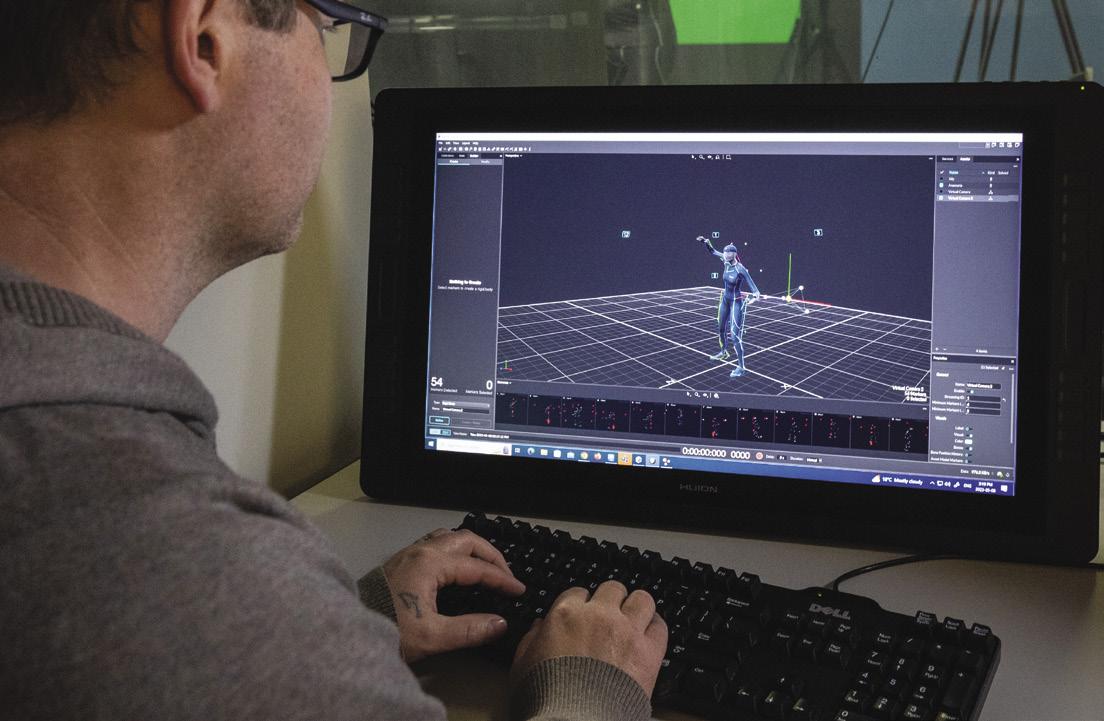
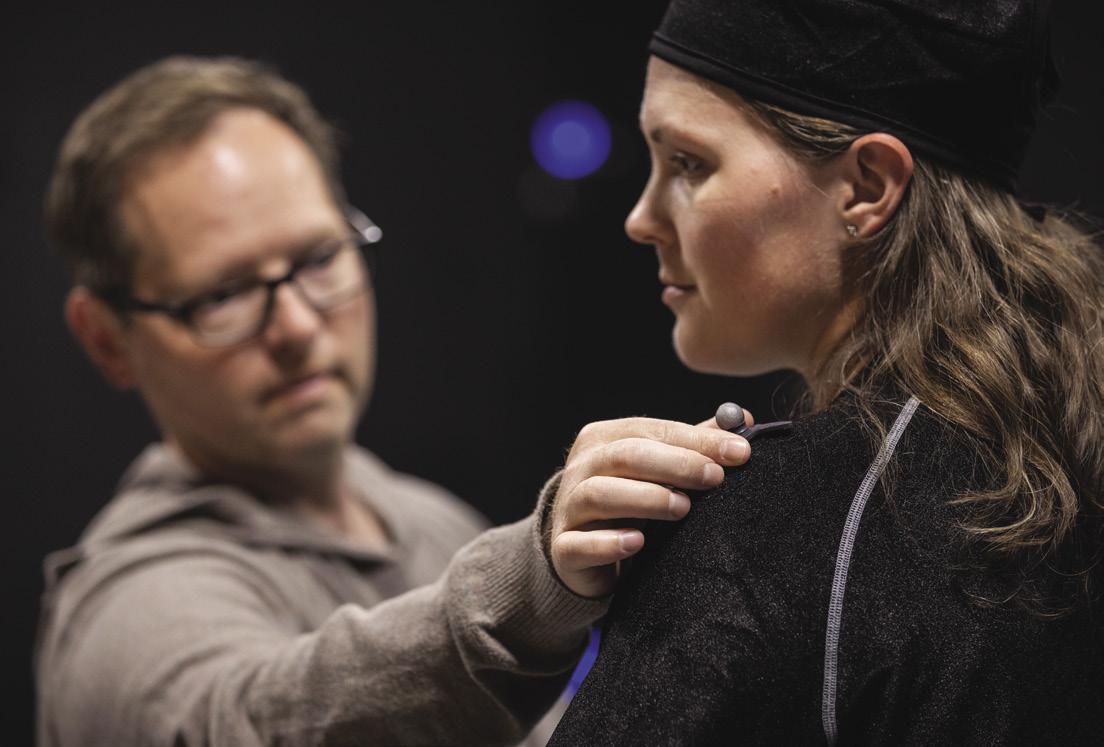
Tyler Heaton says, “To borrow a phrase from Mike McCready, ‘If a picture is worth a thousand words, an experience is worth a thousand pictures.’ With immersive and spatial technology, we can show, share and do, resulting in real skill development. We can use real-time data to simulate scenarios in a safe way that yields real results that can be applied to physical operations.”
Innovative development in extended reality, virtual reality and augmented reality continues to expand, and the future is limitless according to those involved with START research projects. Heaton says, “The most important technology to watch over the next two to five years will be real-time 3D. Spatial tools and technologies are an essential part of building these environments. Virtual and mixed reality are effective tools for accessing these new worlds. They are like windows into these virtual worlds. But at the end of the day, real-time 3D is making it all possible. Business, entertainment, research and education will all be changed by the adoption of tools that leverage real-time 3D.”
“Anything is possible in VR,” adds McCready. “The key is matching the solution to the problem. Some may want to incorporate VR because of the novelty and look for problems that VR can solve. As partners come to us with specific problems, we work with them to identify if VR can solve them, and then if it can, we collaboratively develop a solution.”
The Lethbridge College START Centre can develop solutions for your organization too. To learn more, please contact START at: 403.320.3468 • spatial@lethbridgecollege.ca
“If a picture is worth a thousand words, an experience is worth a thousand pictures.”
Mike McCready Industry Liaison and Research Advisor, START Centre
Industry Liaison and Research Advisor – START Centre
Tyler Heaton is a 2001 graduate of the college’s Multimedia Production program who went on to earn Bachelor of Fine Arts and Master of Fine Arts degrees from the University of Lethbridge. His primary research focuses on using spatial media and technology to create media and information such as photogrammetry, laser scanning and spatial audio production. He also designs immersive and interactive experiences for virtual and mixed reality, and he designed and operates the performance capture studio at the college, a one-of-a-kind space in Alberta.
Lead Extended Reality (XR) Developer – START Centre
Sujan Sooriyakumar earned an Advanced Diploma in Game Programming at Humber College in Toronto, where he learned about the capabilities of different game engines. During his time there, he was eager to explore how modern game engines could be applied in industries beyond video games. He entered the research field at York University, where he studied vision science and developed virtual reality and augmented reality applications for experiments.
At Lethbridge College, Sooriyakumar has been developing a range of XR applications to push the boundaries of XR hardware. His research primarily focuses on leveraging virtual reality technology to enhance training effectiveness and efficiency. Sujan firmly believes that the strengths of XR content are limitless, providing immersive and engaging experiences with endless possibilities.

Junior Developer – START Centre
Austin Hatch graduated from the college’s Virtual and Augmented Reality program in 2022 and from the Multimedia Production program in 2018. As a Junior Developer with the START team, Hatch assists in creating innovative training experiences. He has contributed to several notable projects, and he played a vital role in developing a web augmented reality data visualization tool using 8th Wall technology. He has most recently been involved in researching and testing hardware for an upcoming driving simulator project. He says his work with START has given him first-hand experience with cutting-edge hardware.
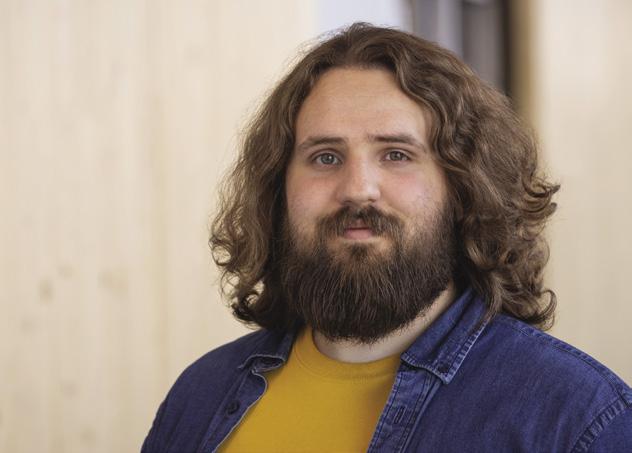
lethbridge college.ca/start
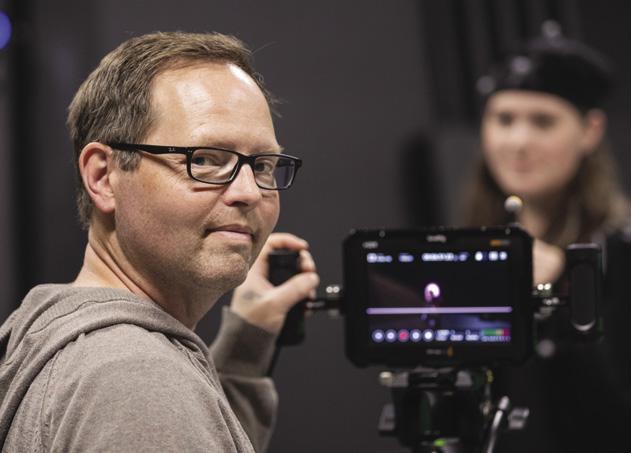

Lethbridge College has considerably expanded its on-site agriculture research capabilities through two key actions.
First, in 2022, the college officially acquired the former Farm Stewardship Building from Alberta Agriculture and Irrigation. Then, with the intent of continuing to provide industry-driven research services in the building, administrators in the Centre for Applied Research, Innovation and Entrepreneurship (CARIE) sought grant funding to transform the space. A PrairiesCan grant of more than $2 million, one of the largest applied research grants in the college’s history, covered a portion of the infrastructure costs required to complete development of laboratories in the renovated Agriculture Research Innovation Facility.
“This significant investment by PrairiesCan enabled us to expand our capacity for applied research and innovation to serve the ag industry,” says Dr. Kenny Corscadden, Vice President, Research and Partnerships. “Completion of this project gives our researchers on-campus facilities that have never been available before and will allow them to undertake testing of their on-farm samples that will expedite results and further enhance our ability to report evidence-based information to industry for adoption.”
The facility as a whole is becoming a hub for industry-driven agriculture applied research and innovation with CARIE. It houses offices for agriculture research and technical staff, seven state-of-the-art research laboratories, coolers for crop storage projects, and an essential collective workshop space for preparing and maintaining instruments and equipment for on-farm projects.
New lab space will be used for applied research and analysis of a variety of agricultural products and byproducts.

“The labs significantly increase our ag research capacity and ability to serve small- and medium-sized enterprises,” says Megan Shapka, Director of Applied Research Operations.
“Our researchers work directly with agriculture producers, food processors, industry and other affiliated groups to diversify our economy and strive for a sustainable future. Our innovative solutions benefit the local and provincial economies as we support innovative smalland medium-sized ag-tech and agri-food producers in their efforts to start up and scale up operations and develop new market opportunities.”
The new space allows these potential opportunities to unfold. In addition to the infrastructure funding for the new lab space itself, the PrairiesCan grant also provides three years of funding for four highly qualified personnel to operate specialized equipment in the high-tech agriculture research laboratories. Researchers will use the updated facility in tandem with other spaces currently under management of the college through a collaboration with Alberta Agriculture and Irrigation, such as the Lethbridge College Research Farm located just east of Lethbridge, and the Brooks Research and Production Greenhouse located about 150 kilometres northeast of Lethbridge.
Teams from the college’s Mueller Irrigation Research Group and Advanced Post-harvest Technology Centre will be the primary users of the new labs, but many of the spaces have been designed with cross-disciplinary purpose, so the teams from Aquaculture Centre of Excellence and Centre for Sustainable Food Production will also utilize some equipment for specific projects.
“The laboratory spaces will boost our capacity for analytical work, as it means that we will have less analysis done by third parties and can do more in house. That’s great for our own research and student projects, and it will also increase our flexibility to work with industry,” says Dr. Willemijn Appels, Senior Applied Research Chair, Mueller Irrigation Research Group.
Previously secured analytical equipment and more recent irrigation technology and equipment, predominately funded from Canada Foundation for Innovation (CFI) grants, will be located on the research farm and in the new labs.
“We have recently secured a CFI grant,” says Appels. “While we will use that largely to upgrade irrigation technology at the research farm, we will also use it towards a couple of crucial pieces of lab equipment, including a nutrient auto-analyzer and a gas chromatograph. Dedicated spaces mean that
“The labs significantly increase our ag research capacity and ability to serve small- and medium-sized enterprises. Our researchers work directly with agriculture producers, food processors, industry and other affiliated groups to diversify our economy and strive for a sustainable future.”
Megan Shapka, MEd Director, Applied Research Operations
we can perform soil physical, soil chemical, and plant analyses more easily. We are aiming to apply precision agriculture management techniques on the research farm, and the laboratories will support that goal.”
Some other equipment to be used in the new lab space includes cutting-edge near-infrared (NIR) hyperspectral imaging technology to test product quality quickly without destroying good product samples. An NIR hyperspectral imaging system and machine learning techniques are being used in the space to detect and measure quality parameters in potatoes such as internal defects, greening, sugar content and specific gravity, which is a measurement of the solids or starch content in potatoes. Without this type of specialized equipment and skilled personnel to operate it, quality testing would consist of cutting open sample potatoes, leading to significant waste of quality products. This research will identify the most significant
wavelengths required to detect quality parameters, and it will test the NIR hyperspectral imaging system at speeds simulating commercial scanning speed, eventually leading to a prototype for commercial application of the system based on extensive testing and analysis.
“The cost has gone down for this technology. The cameras and supporting technology are less expensive and the processing is much, much faster, so we are at a point where this technology can be implemented on a large scale,” says Dr. Chandra Singh, Senior Applied Research Chair, Advanced Post-harvest Technology Centre. “The companies I am working with want to commercialize this technology and are ready to go if this project is successful,” says Singh. “That is what we want to see – the research outcomes benefiting the end users, so we look forward to using this technology to help the industry in the future.”
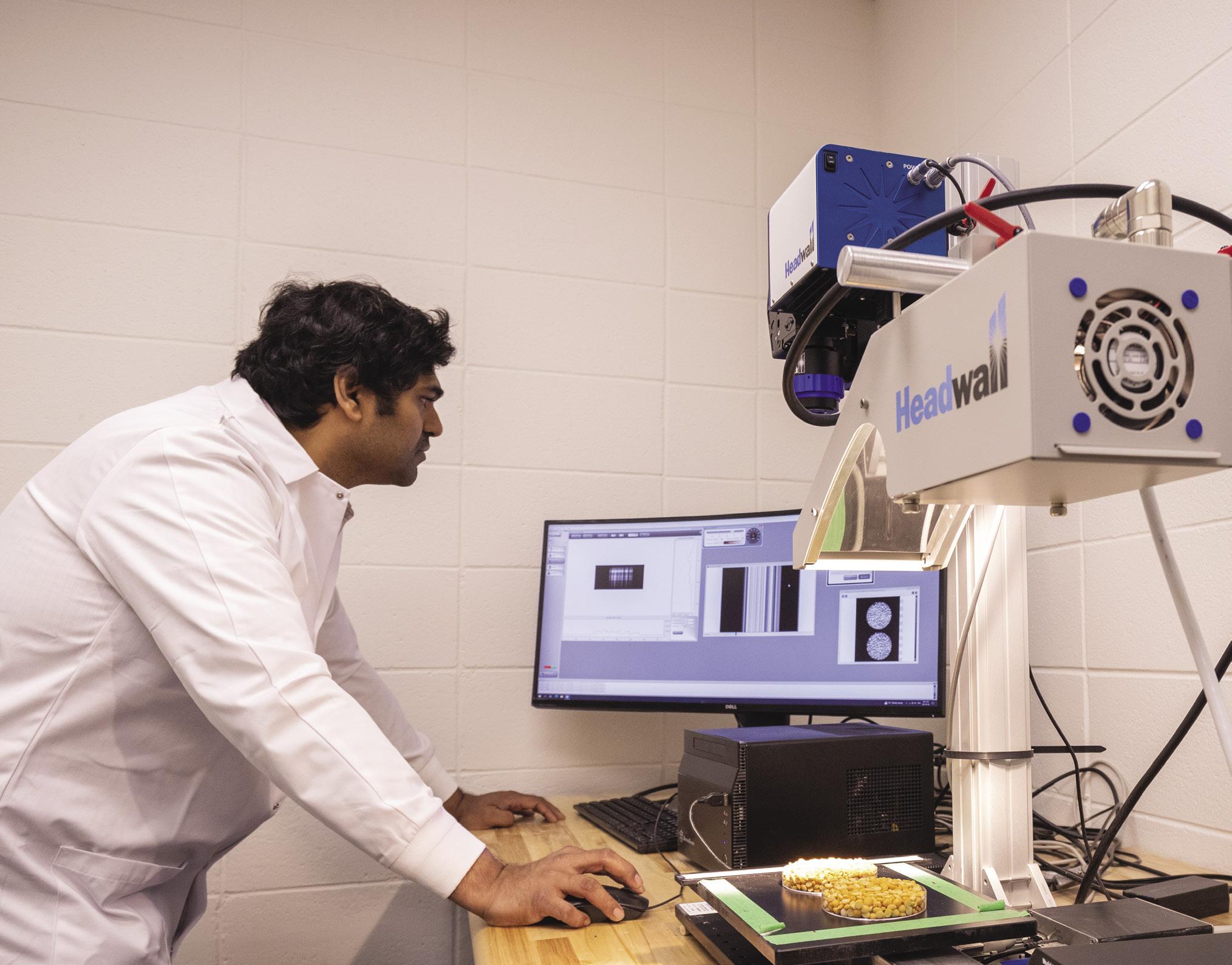
The NIR imaging system is one of the most advanced hyperspectral systems available, with a wide range of applications in food quality and safety testing, so the system is in demand across the country. In fact, three PhD students from the University of Guelph in Ontario used the system at Lethbridge College as part of their research to evaluate chickpea quality and detect adulteration in chickpea flour; to detect glyphosate residues in lentils; and to study the detection of deoxynivalenol in corn grain and flour.
Singh says funding is the key to enabling and expanding these types of innovative applied research efforts at Lethbridge College. He says, “Funding is critical to build research infrastructure and conduct research. The CFI grant and provincial funding programs have helped in developing the Advanced Post-harvest Technology Centre at the
college. Research Funding from Alberta Innovates, Results Driven Agriculture Research (RDAR), Canadian Agricultural Partnership (CAP), Potato Growers of Alberta (PGA), Alberta Sugar Beet Growers (ASBG), the Alberta Wheat Commission, the Saskatchewan Wheat Development Commission, Protein Industries Canada and support from our industry partners has enabled us to recruit a diversified and talented pool of research associates and post-doctoral fellows for various research projects.”
The NIR project is funded by Alberta Innovates and RDAR, while industry partners Old Dutch, Lamb Weston and PGA are collaborators on the research. The NIR imaging system itself is funded by an Applied Research Tools and Instruments (ARTI) grant from the Natural Sciences and Engineering Research Council of Canada (NSERC).
Senior Applied Research Chair – Mueller Irrigation Research Group Dr. Willemijn Appels and her team work closely with industry partners, such as farmers and producer associations, on a range of projects. Her research focuses on monitoring soil moisture dynamics in fields using different irrigation methods and investigating how technologies and software can enable more sophisticated water management on farms.
Senior Applied Research Chair –Advanced Post-harvest Technology Centre
Dr. Chandra Singh and his team work to address the gap in post-harvest handling and storage of produce and grains. He is focused on developing post-harvest engineering solutions using advancements in sensing, automation, internet of things, cloud computing, artificial intelligence (AI), machine vision, hyperspectral imaging and mathematical modelling.
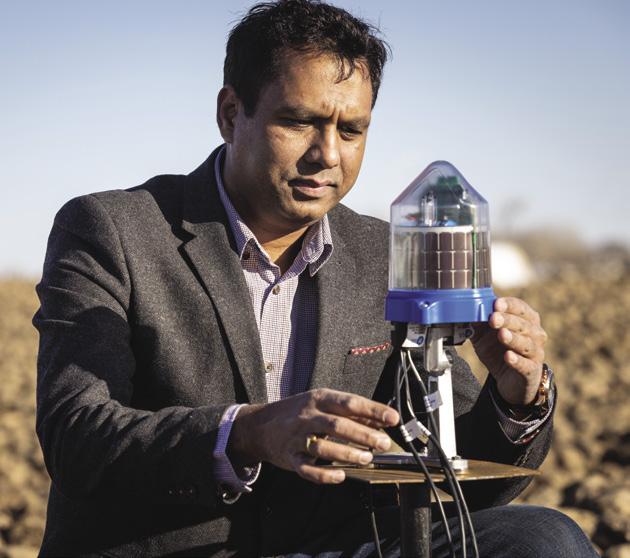
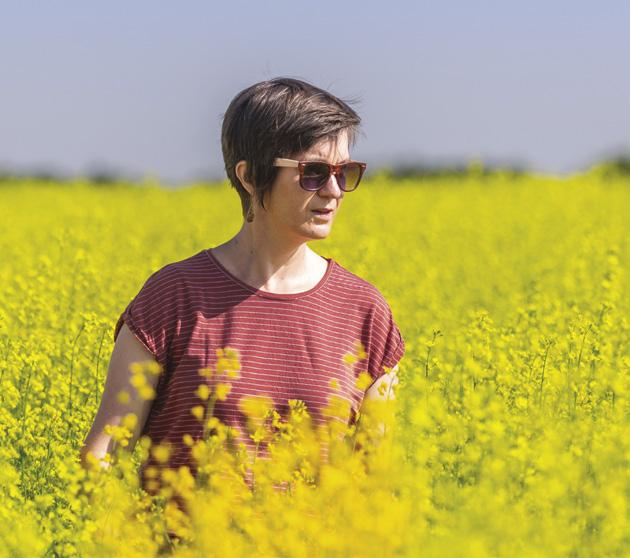
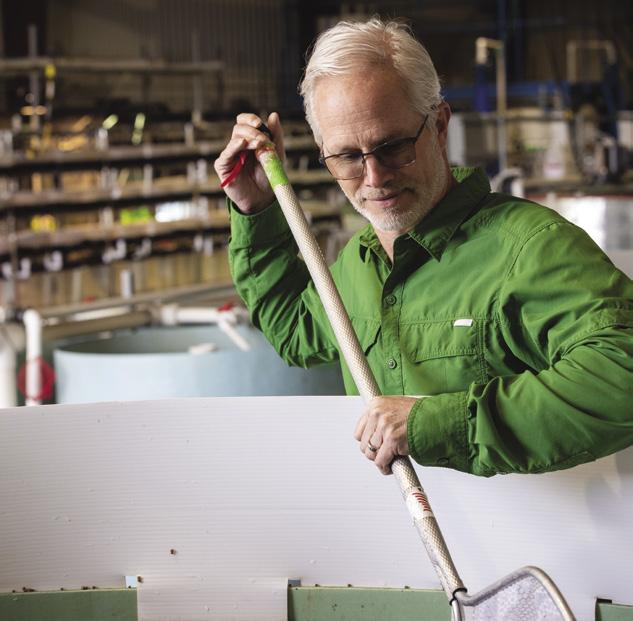
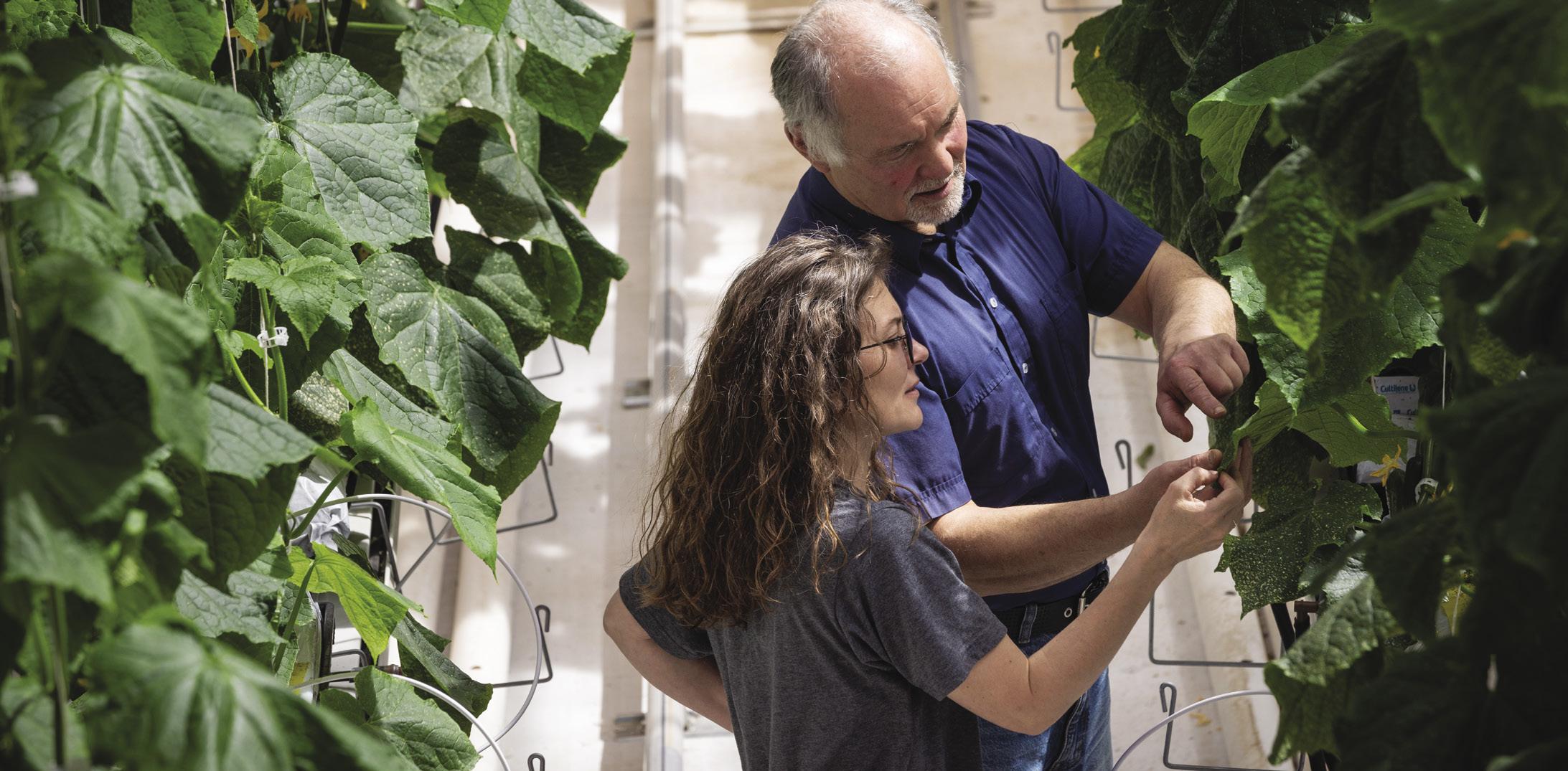
CARIE has also added new lab space in the recently constructed Centre for Sustainable Food Production (CSFP), a 10,000 square-foot research greenhouse. The CSFP lab will house top-end water quality analytical equipment, including an automated analyzer for water chemistry analysis that will be coupled with a high-end Inductively Coupled Plasma Mass Spectrometry (ICP-MS) to do analysis with an accuracy in the parts per billion. Also, a laser particle size analyzer will do particle analysis to quantify efficiency of filtration and better assess suspended solids analysis in water quality.
“The CSFP lab will be dedicated space for our analysis, to better and more efficiently support our research,” says John Derksen, Chair, Aquaculture Centre of Excellence. “The past few years we were borrowing underutilized lab space in another building, which reduced efficiency and quality of analysis. If our capacity increases, the types of research we can do expands, and the number of highly skilled people needed to run the equipment and work together on projects will also increase.”
Top: The Centre for Sustainable Food Production greenhouse.
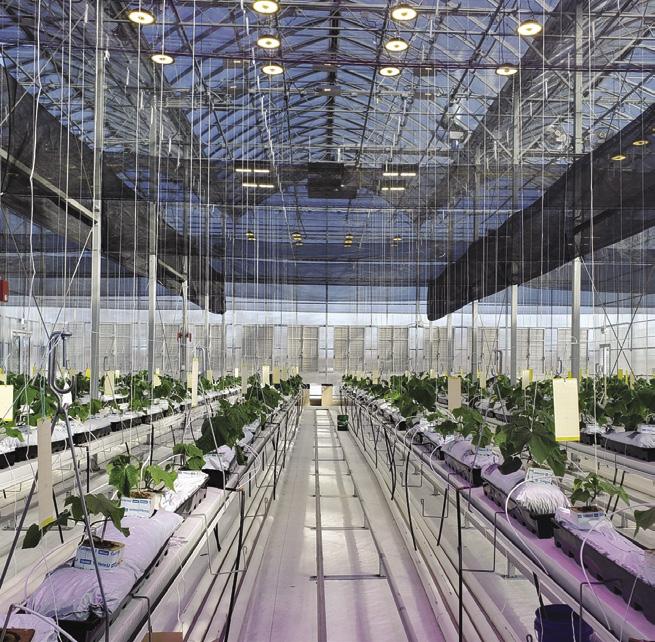
Middle: John Derksen, Chair, Aquaculture Centre of Excellence (ACE)
Below: Dr. Nick Savidov, Senior Research Scientist, ACE, and Dr. Selin Karatepe, Post-Doctoral Fellow, CARIE.

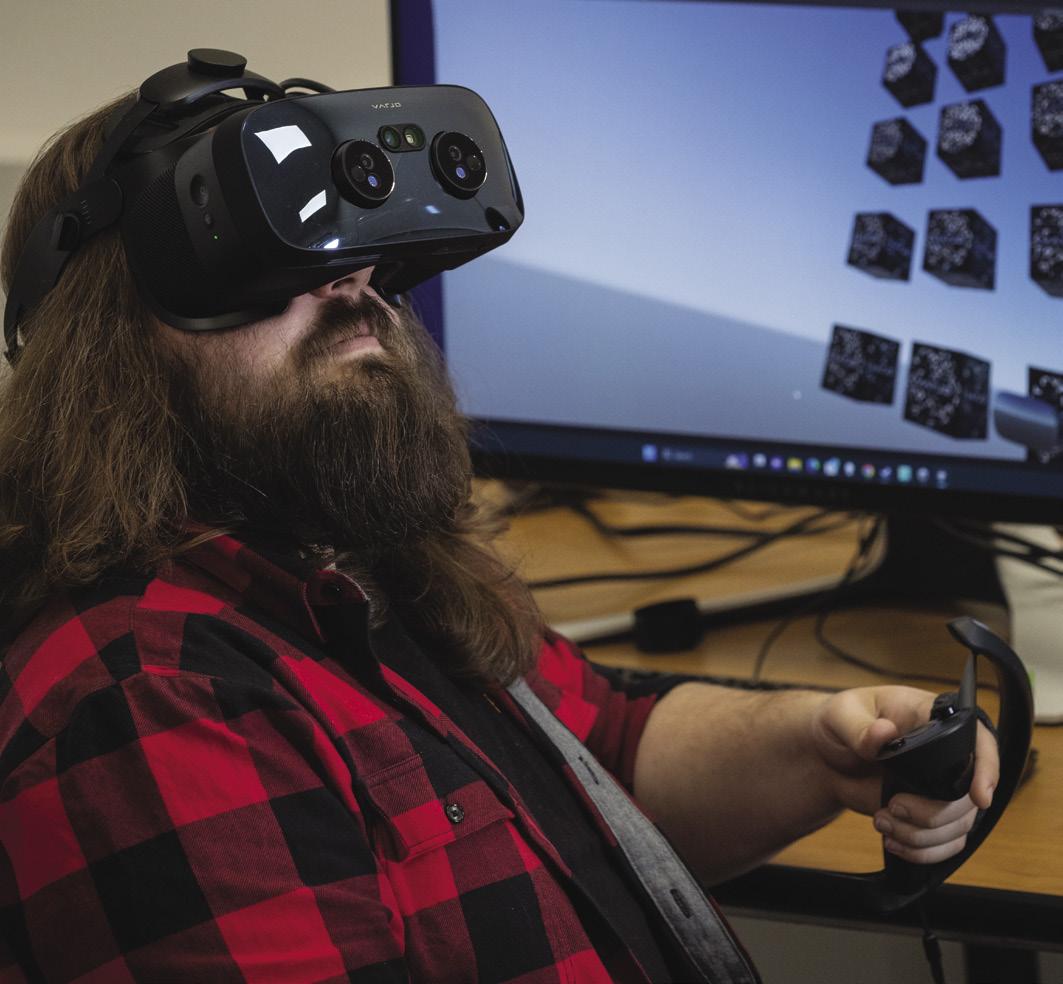
$10 million 83
$10,167,304 TOTAL SPONSORED RESEARCH INCOME FROM GOVERNMENT GRANTS, INDUSTRY CONTRIBUTIONS AND DONATIONS IN 2022-23
TOTAL NUMBER OF RESEARCH PARTNERSHIPS IN 2022-23
Left: Junior Developer Austin Hatch in the Spatial Technologies Applied Research and Training (START) Centre.20
NUMBER OF YEARS DR. NICK SAVIDOV, LEAD RESEARCH SCIENTIST, AND JOHN DERKSEN, CHAIR, AQUACULTURE CENTRE OF EXCELLENCE, HAVE WORKED TOGETHER IN THE INDUSTRY
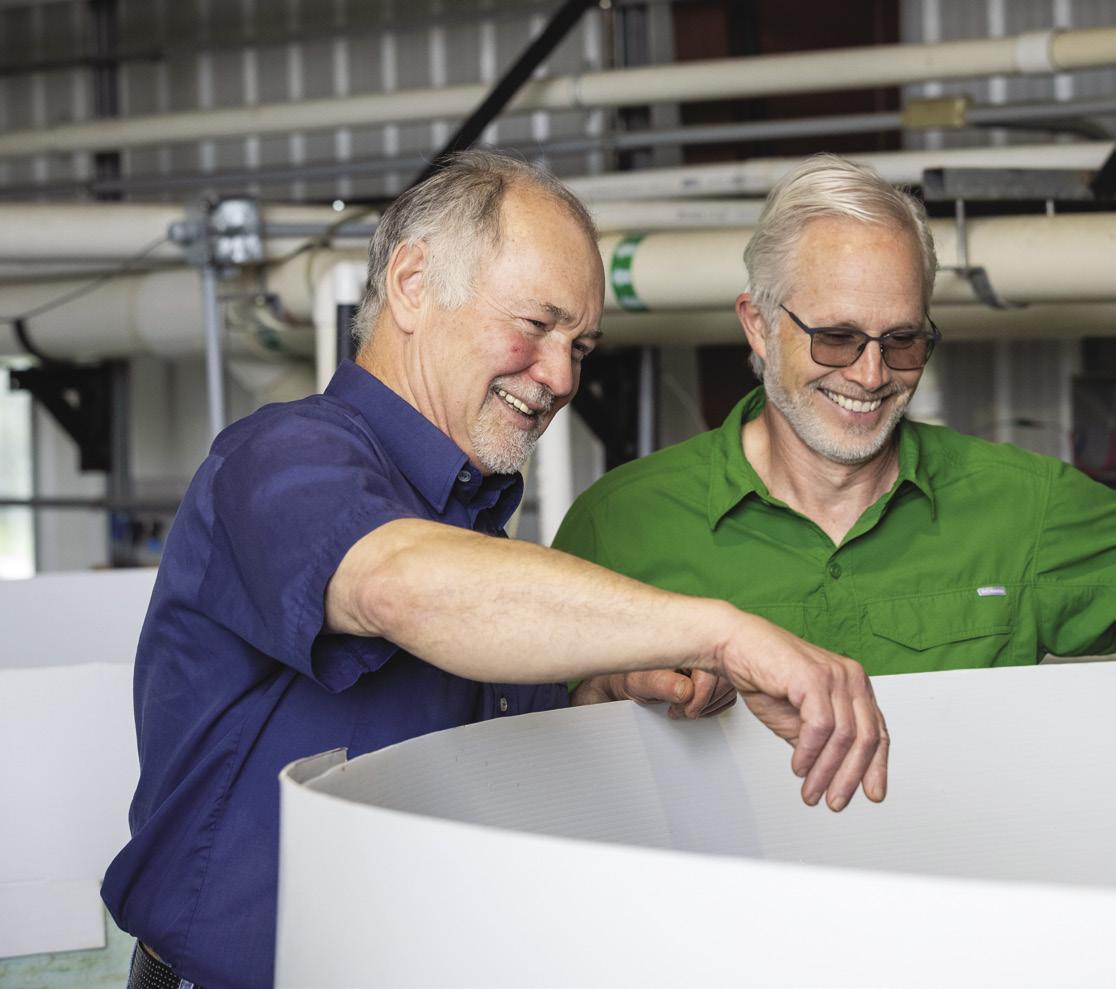
87
TOTAL NUMBER OF PAID STUDENT RESEARCHERS
NUMBER OF POST-DOCTORAL FELLOWS IN APPLIED RESEARCH 9
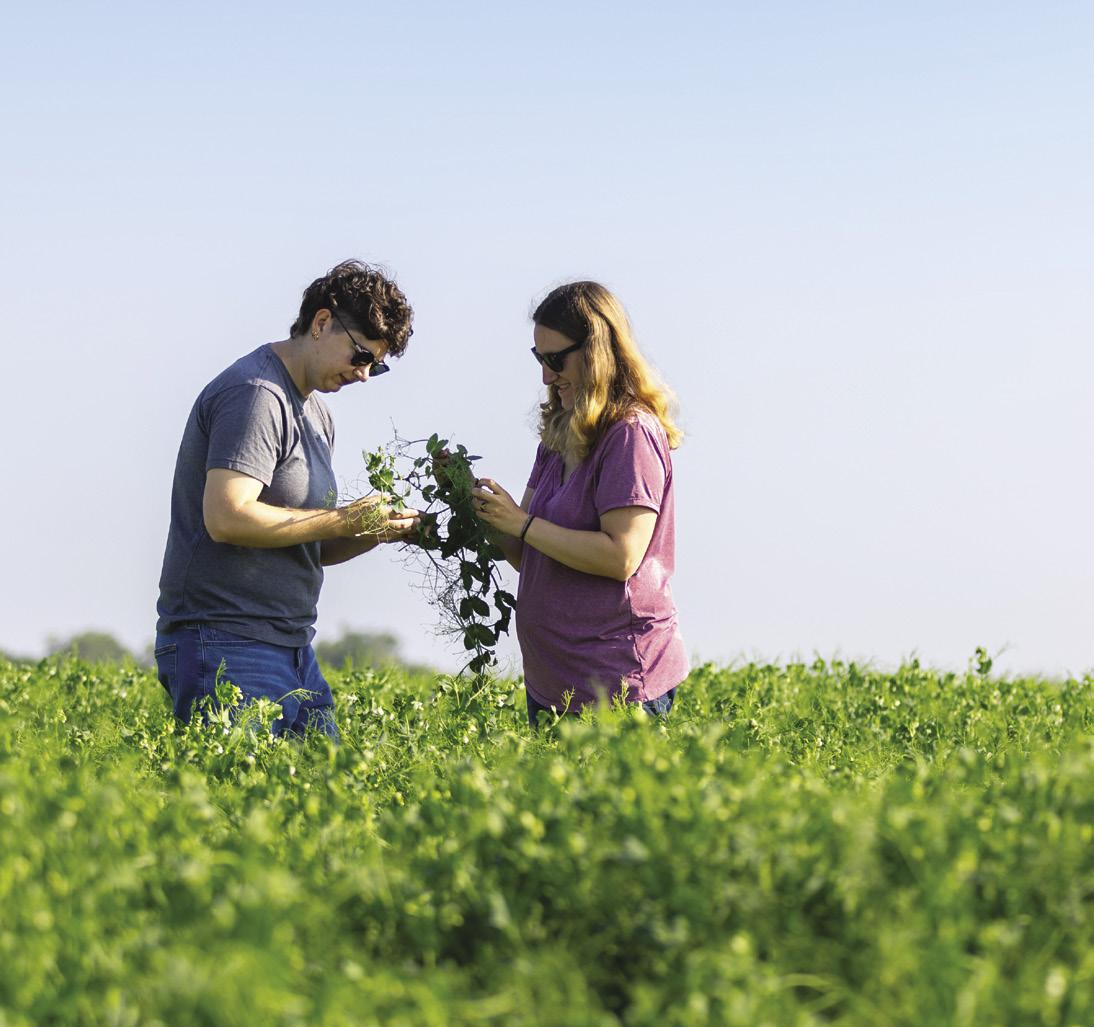 Left: Dr. Nick Savidov (left) and John Derksen (right) in the Aquaculture Centre of Excellence (ACE).
Left: Dr. Nick Savidov (left) and John Derksen (right) in the Aquaculture Centre of Excellence (ACE).
Lethbridge College became the seventh member of the Pan-Canadian Smart Farm Network – a collective network of Smart Farms supporting Canada’s agriculture sector to enhance efficiency, sustainability and resilience in response to emerging opportunities and challenges in the agriculture industry. The network has members across three Canadian provinces working collaboratively toward advancing ag tech solutions and sustainability across the country.
By joining the Pan-Canadian Smart Farm Network, Lethbridge College is expanding the network into southern Alberta – Canada’s Premier Food Corridor. The Centre for Applied Research, Innovation and Entrepreneurship (CARIE) at the college is dedicated to economic growth, sustainability and social development in the region. CARIE supports on-farm activities with a 385-acre irrigated research farm located just east of Lethbridge, numerous irrigation systems and related technology, field-scale plots, crop production and a state-of-the-art grain drying facility. CARIE also has over 7,000 square feet of laboratory spaces, and more than 20,000 square feet of controlled-environment agriculture facilities – including the internationally-known Aquaculture Centre of Excellence and Centre for Sustainable Food Production.
The Pan-Canadian Smart Farm Network was launched in 2021 by Olds College. In addition to Lethbridge College and the Olds College Smart Farm, it includes Discovery Farm Langham located just north of Saskatoon, Lakeland College located at Vermilion, Alta., University of Saskatchewan Livestock and Forage Centre of Excellence located near Saskatoon, Manitoba Beef and Forage Initiatives Inc. located near Brandon, Man., and Enterprise Machine Intelligence and Learning Initiative located near Winnipeg.

“I’m thrilled to welcome Lethbridge College into the Pan-Canadian Smart Farm Network,” says Dr. Joy Agnew, Vice-President of Research at Olds College. “Lethbridge College brings expertise in irrigated crop production, grain storage management and horticulture production, among other things. Together, this network of smart farms can truly drive innovation and growth in Canada’s diverse agriculture industry.”
Linking smart farms across the country multiplies knowledge and increases the value of data generated to connect farmers with industry and research partners to find practical solutions to ag challenges. With funding from the Canadian Agri-Food Automation and Intelligence Network (CAAIN), the Pan-Canadian Smart Farm Network initiative aims to accelerate the development and adoption of ag technologies and systems to help producers manage risks, increase productivity and improve sustainability of farms across Canada.

Lethbridge College is a Principal Member of the Metaverse Standards Forum, which was founded in June 2022. The forum provides a venue for collaboration among companies and leading standards organizations around the world with the goal of fostering the development of interoperability standards for an open and inclusive metaverse. Interoperability is the foundation of the metaverse, enabling multiple technologies to connect and work together to scale and evolve into an open, inclusive platform for use by everyone. While the industry-wide forum is not responsible for creating metaverse standards, member organizations will cooperate to encourage the evolution and adoption of a set of standards.
“Just as standards were developed to allow various devices to access the internet and websites to connect to each other, the metaverse – as it evolves – requires a similar approach,” says Dr. Kenny Corscadden, Lethbridge College Vice President, Research and Partnerships. “As a proven leader in the
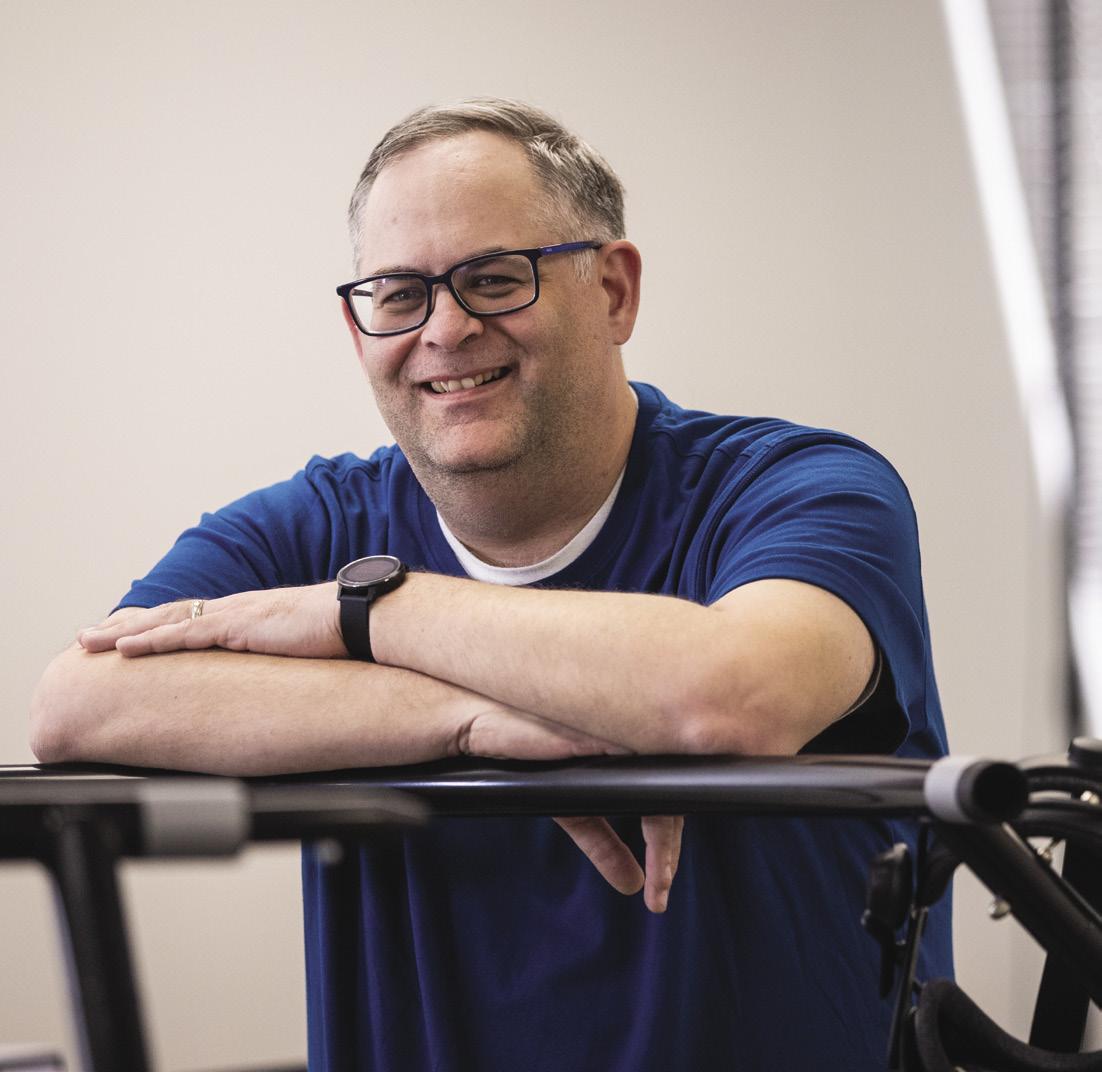
field of virtual and augmented reality, we are excited to be part of this organization and look forward to playing an important role in the progression of metaverse standards.”
The Metaverse Standards Forum is open to any company, standards organization or post-secondary institution at no cost. The group of 37 founding members includes several recognizable names such as Microsoft, Unity, IKEA and the World Wide Web Consortium. In its first year since launching, membership has grown to more than 1,800 organizations. As a Principal Member, Lethbridge College will play an active role in forum management – offering project support and oversight.
“Joining the Metaverse Standards Forum is a huge step forward for the college,” says Mike McCready, Industry Liaison and Research Advisor, Spatial Technologies Applied Research and Training (START) Centre. “It demonstrates our continued leadership and commitment in the world of spatial and immersive technologies.”
Lethbridge College is a leader in the virtual and augmented reality (VR/AR) space. Applied research projects are facilitated through the START Centre, and the college also offers a one-year Virtual and Augmented Reality certificate program for students.
“Joining the Metaverse Standards Forum is a huge step forward for the college. It demonstrates our continued leadership and commitment in the world of spatial and immersive technologies.”
Mike McCready
Industry Liaison and Research Advisor, START Centre
Lethbridge College’s Centre for Technology, Environment and Design (CTED) recently launched its Wildlife Analytics Lab (WAL). The new WAL research initiative is the first of its kind in Canada – offering fee-for-service cementum analysis of wildlife teeth.

Cementum analysis is a technique that involves examining cementum, which is a hard tissue covering the roots of teeth. This type of analysis can determine the age, reproductive history and even migratory patterns of wildlife species. Tens of thousands of teeth are collected from wild animals in Canada every year to estimate their age, but there hasn’t been a commercial cementum analysis lab in Canada. As a result, this much-needed WAL service will reduce costs, turnaround times and logistics for agencies who otherwise would have sent biological samples to the United States for testing.
The WAL team completed a preliminary comparative analysis for Alberta Environment and Protected Areas, and is receiving tooth analysis contracts from agencies and researchers across Canada to improve wildlife management decisions and conservation efforts with a made-in-Alberta solution. Two collaborative applied research projects include estimating the age distribution of the provincial mule deer and other ungulate populations to help inform harvest management decisions, and gaining a better understanding of the effects of chronic wasting disease on ungulate populations.
The Alberta Professional Outfitters Society (APOS) has been instrumental in establishing the WAL by providing more than $145,000, which enabled the WAL to purchase analytical equipment and hire a dedicated lab technician.
“APOS was proud to provide financial support to help bring the vision for the Wildlife Analytics Lab into fruition,” says Corey Jarvis, APOS President. “Strong and reliable data needs to be the foundation for wildlife management in our province. The lab provides an innovative and affordable madein-Alberta solution to data procurement that meaningfully engages stakeholders. APOS is confident that the lab will become an excellent resource to support wildlife stewardship to the benefit of all who use and appreciate wildlife in Alberta.”
“In addition to providing a unique service, this lab will also create training, research and employment opportunities for current students,” says Dr. Terry Kowalchuk, Dean, Centre for Technology, Environment and Design. “It’s an innovative way to satisfy the work-integratedlearning focus of post-secondary institutions and we are very thankful to APOS for supporting us in this endeavour.”
Dr. Everett Hanna, WAL Scientific Lead and School of Environmental Sciences instructor says, “We also look forward to the opportunities the WAL will create for students and employees at Lethbridge College, growing our presence on the national and international research stages.”
Lethbridge College received $1 million in infrastructure funding from the Canada Foundation for Innovation (CFI) College Fund to expand the capacity of its applied research in irrigation science.
The grant will support infrastructure needs at the Mueller Irrigation Research Group’s Smart Irrigation Farm, located at the Lethbridge College Research Farm just east of Lethbridge.
Dr. Willemijn Appels, Senior Applied Research Chair for the Mueller Irrigation Research Group says, “The CFI grant will help us to increase the capacity of our group to do plot and field scale experiments on the LC research farm. We’ll be able to purchase the latest irrigation technology and plant/soil sensing equipment to investigate the effects of management decisions regarding irrigation management, nutrient and land management on soils and crops in great detail. Our goal is to distill practical management strategies for precision agriculture (irrigation) from this detailed work.”
The CFI funding will specifically be used to upgrade the irrigation equipment on the research farm. The centre pivots and linear move systems will be outfitted with variable rate irrigation (VRI) technology, better remote communication systems and other equipment required to make sitespecific irrigation management possible. The research team will also purchase sensors that will increase the capability to get instant observations of plant, soil and weather conditions anywhere on the farm. The funding will also help provide some pieces of agricultural equipment that will be used in doing plot and field experiments, as well as a couple of pieces of lab equipment that will allow researchers to perform some sample analysis on campus that was previously outsourced.
Appels adds, “The equipment will also boost our capacity for laboratory work as well, which means that we will need to have less analysis done by third parties and can do more in house. That’s great for our own research and student projects, and it will also increase our flexibility to work with industry.”
The new equipment will provide the latest developments in the field of precision irrigation and will significantly increase the college’s capacity to perform precise research investigations of soil and crop quality.
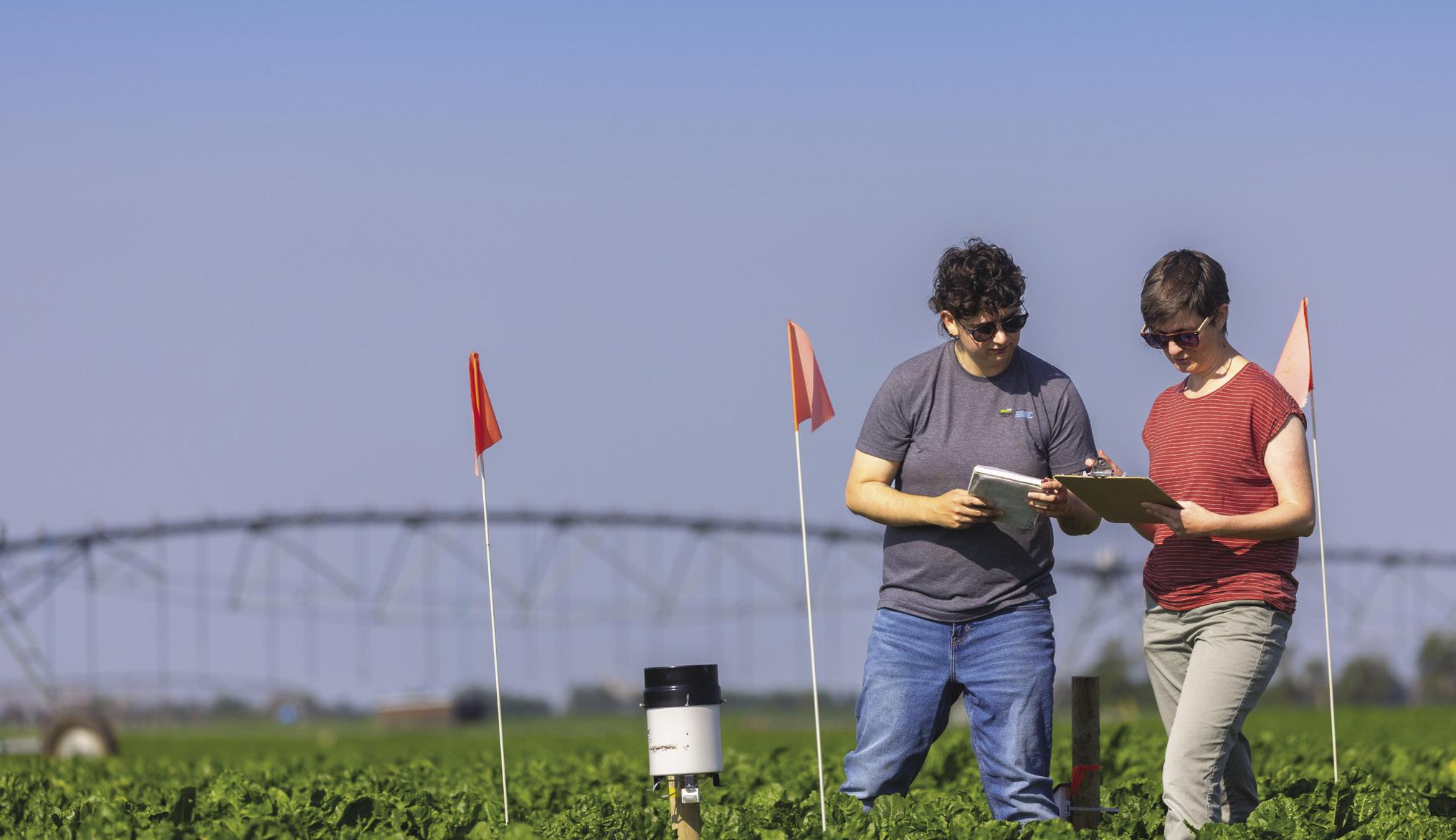
Proper training is vital for technicians who work on high-voltage equipment, so ENMAX Energy Corporation (ENMAX Energy) partnered with researchers at Lethbridge College to develop a virtual reality (VR) training module pilot that delivers high-risk technician training under controlled conditions.
Through the college’s Spatial Technologies Applied Research and Training (START) Centre, ENMAX Energy and the college created an interactive training experience that allows ENMAX Energy team members who work at the company’s electricity generation plants to have endless learning opportunities in the safety of a VR environment.
“We created authentic-based training,” says Mike McCready, START’s Industry Liaison and Research Advisor. “We prioritized making the environment, interactions and experience feel as real as possible. We worked closely with ENMAX Energy staff to develop something that really complements and enhances their training.”
The VR experience cannot completely replace specialized hands-on training and skilled precision, but it allows technicians to familiarize themselves with the equipment and processes in VR before working directly with high-voltage equipment, which helps reduce the risk to team members and the demand on equipment in the ENMAX Energy training facility.
“Feedback from team members has been extremely positive about this new approach to technical training,” says Shelley Pinder, ENMAX Energy Technical Training Specialist. “Using VR for training produces memorable moments that become engrained in an employee’s mind and day-to-day actions. With this approach, information can be recalled the next day,
the next month and even the next year after training.”
ENMAX Energy and Lethbridge College researchers collaborated with curriculum designers in the college’s Centre for Teaching, Learning and Innovation to develop a full training module so the VR experience has specific goals and learning outcomes.
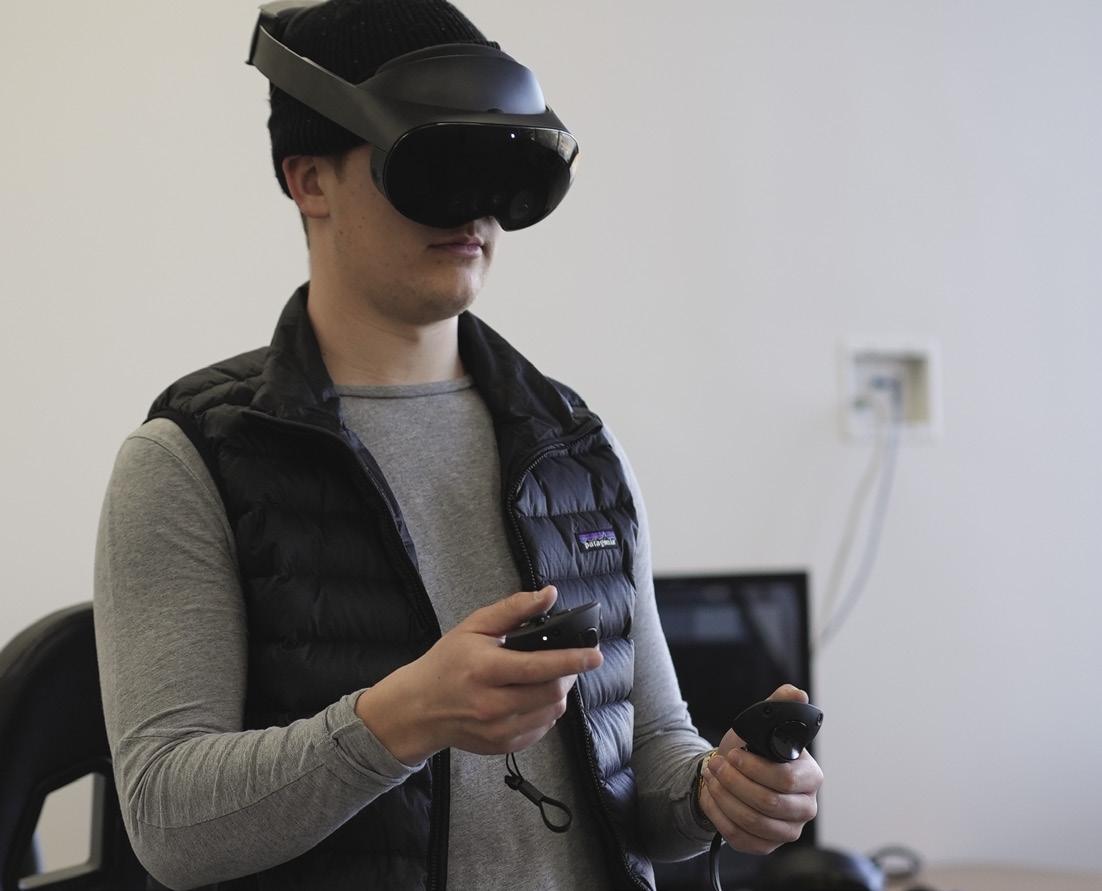
“Being able to develop this project with ENMAX Energy is another indication of how we can use our resources to meet industry needs,” says Dr. Kenny Corscadden, Lethbridge College Vice President, Research and Partnerships. “We have had success creating competencybased training programs for other industry partners, such as the Lethbridge Police Service and Cavendish Farms, and we are pleased we were able to work closely with ENMAX Energy to create a solution that works for them.”
Development of the training was partially funded by a Natural Sciences and Engineering Research Council Engage Grant.
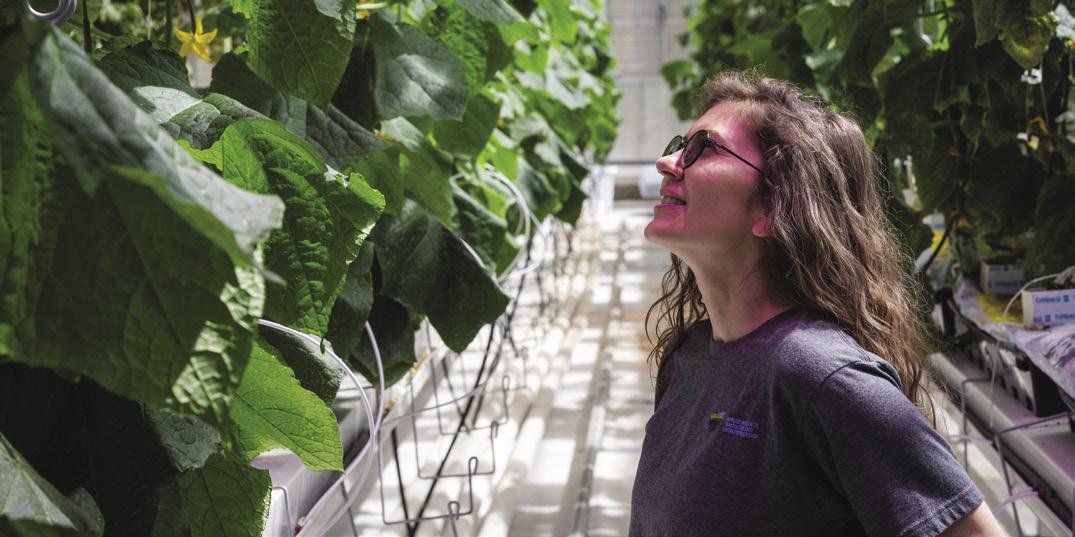
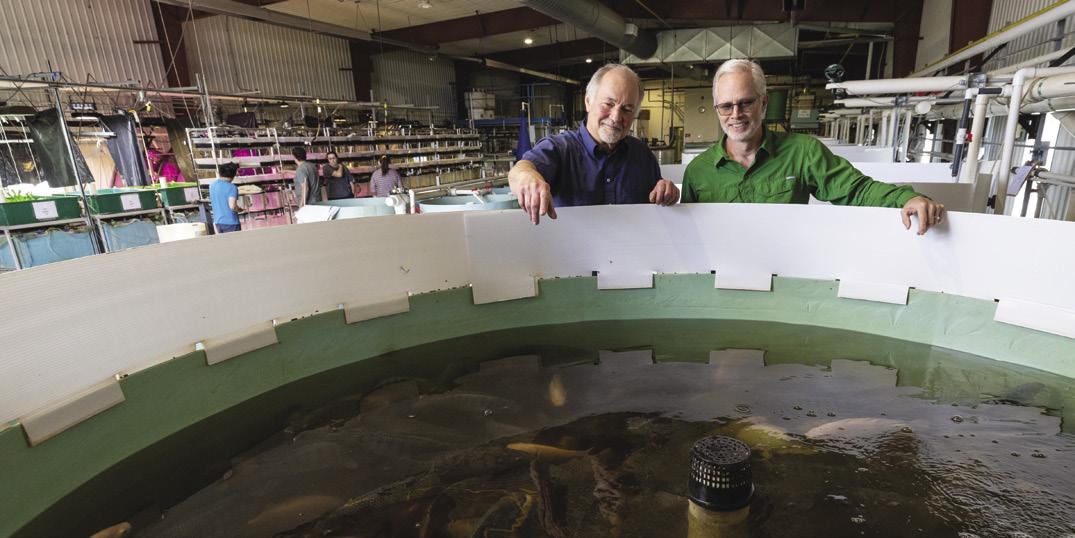
Global businesses increasingly focus on social and environmental goals alongside profitability. This aligns with the growing demand for sustainable food production, efficient resource utilization, and the environmental benefits of technology investments. Lethbridge College’s aquaponics model applied research project will help provide business leaders with a decision support system for financial, environmental and risk management aspects of aquaponics operations.
The project is designed to address the key challenges agricultural investors face when
considering aquaponics investments. The research is comprised of an interactive data analytics platform that enables comprehensive economic analysis of aquaponics investments.
The platform involves three interconnected yet stand-alone modules. The first is the investment analysis module, which offers detailed financial evaluations that enable investors to make informed decisions. The second module focuses on environmental impact, quantifying and monetizing items to help businesses and investors understand and minimize their ecological footprint while generating a financial return. By integrating the outputs from this module with the investment analysis module, researchers will be able to estimate a metric for sustainable return on investment (ROI) that reflects the production method’s contribution to the Sustainable Development Goals (SDGs).
The third module is dedicated to risk management, providing scenarios for various risk factors, such as economic, technical and environmental risks, which enables stakeholders to anticipate, mitigate and manage these challenges effectively.
“I hope that this project is just the beginning of our journey toward supporting a greener and more responsible agricultural landscape by providing comprehensive economic assessments for various innovative agricultural practices,” says Dr. Selin Karatepe, Post-Doctoral Fellow in Applied Research. “Through interdisciplinary collaboration, research and innovation, the potential of aquaponics can be utilized to transform food systems and contribute to a more sustainable and equitable future.”
The potential outcomes from this research project include stimulating investments in aquaponics, promoting a cost-effective circular economy, and contributing to the economic development, environmental conservation and social empowerment of the region and the aquaponics industry.
Lethbridge College will receive $353,598 from Results Driven Agriculture Research (RDAR) for a three-year industry-driven greenhouse lighting research project that will begin in fall 2023. RDAR funds projects that focus on advancing agriculture innovation for a sustainable future based on producers’ needs.
The greenhouse lighting applied research project will be the first major project in the college’s recently opened 10,000 square-foot on-campus research greenhouse, called the Centre for Sustainable Food Production, which was funded by Canada Foundation for Innovation (CFI).

The greenhouse sector is the fastest-growing segment of Canadian horticulture as food security and import replacement with local products have become increasingly important to Canadians. Greenhouse-grown vegetables are a billion-dollar industry in Canada that is growing rapidly in our province; Alberta contributed approximately $118.8 million in sales in 2020, up from $55.7 million in 2016. Moreover, Alberta’s emerging greenhouse sector is an essential driver in transitioning to sustainable agricultural production, and Lethbridge College is providing greenhouse research expertise to support applied research projects aimed at advancing innovative indoor growing techniques in Alberta.
The greenhouse lighting project will investigate the performance of conventional High Pressure Sodium lights, horticultural LEDs, and common industrial lights, such as High Bay LEDs. Through this project, researchers hope to identify best practices for supplemental lighting for growing cucumbers, tomatoes and peppers – three of the most popular greenhouse-grown crops in Canada.
Megan Shapka, Director, Applied Research Operations, says, “We designed this facility to test technologies and growing techniques, and we focus on pre-commercial validation for commercial applications because producers
rely on evidence-based research to de-risk their business decisions. Adopting new lighting technology can be expensive, and producers want to ensure strong return on investment (ROI) for any product they install.”
Access to adequate light is a critical factor in greenhouse crop productivity, yet only a small portion of commercial greenhouse operators in North America use supplemental lighting because of the prohibitive costs involved. The successful outcome of this project will remove the adoption roadblocks by the industry and provide more efficient and cost-effective LED lighting.
“With this information, industry can decide how to evolve their business with more efficiency and with less risk,” says Dr. Nick Savidov, Senior Research Scientist. “The project will be holistic in its approach, by measuring not just crop productivity and financial benefit, but also power consumption, setup and maintenance costs for different lighting options. This will provide industry with a full ROI analysis that is appropriate to Canadian conditions.”
Lethbridge College’s Spatial Technologies Applied Research and Training (START) Centre hosted the Metaverse Experience as part of the Inventures conference in June 2023 in Calgary. This international event attracted over 3,000 attendees and generated a wave of interest in the college’s START Centre. More than 600 people interacted with close to $100,000 in equipment and engaged with START team members and experts from around the world through virtual presentations on the Engage platform.
The presentations took place inside a digital twin of the Telus Convention Centre main floor, which was a photorealistic replica created by two Lethbridge College students. Hardware demonstrations were a hit as well, with four headset experiences, including the Varjo XR-3 mixed reality headset, which is the most advanced extended reality (XR) head-mounted display available to industry, and used by companies like Volvo for design and testing.
Other demonstrations included haptic gloves from Manus for touching virtual objects, and a full optical motion tracking volume linked to real-time avatars projected on a Holopops holographic screen. Each demonstration sparked valuable conversations about how this technology can lead to business solutions, resulting in several contacts interested in discussing next steps for applied research and training projects with the START team to support pre-commercial validation and technology adoption.
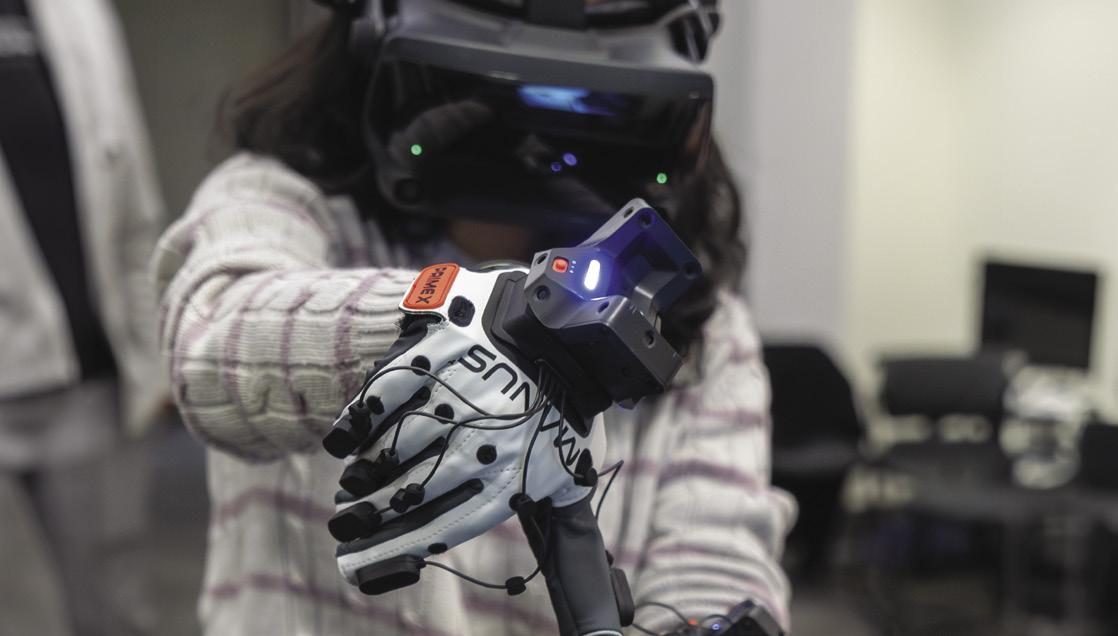
Representatives from Lethbridge College and Sunterra Greenhouse travelled to the Netherlands in February 2023 on a research mission to explore greenhouse technologies and techniques as part of the Weston Family Foundation Homegrown Innovation Challenge Spark Phase. The Netherlands has a long history of greenhouse production and a reputation of being a leader in the industry. The college research team explored a variety of greenhouses and research centres with the goal of generating innovative ideas and opportunities for collaboration.
The research team visited key locations: Philips GrowWise Research Centre in Eindhoven, where the team toured diverse indoor growth chambers employing innovative lighting technology. Delphy Innovative Soft Fruit Centre, where researchers visited the largest and most experienced advisory group for strawberry culture in the Netherlands. The team also visited a low-tech strawberry production facility that uses birds and bugs for a natural ecosystem approach to biological controls that works within strict guidelines on greenhouse fertilizer and pesticide use. Next was an unlit yellow pepper production facility with experimental supplemental lighting, and an unlit cucumber greenhouse that used bubble wrap to reduce energy consumption.
The team also visited two research centres at Wageningen University and Research to promote collaboration and recruitment of post-doctoral fellows. The site visits included Unifarm and the Bleiswijk Wageningen Plant Research facility, featuring multiple greenhouses and growth chambers for vertical farming applications. Lastly, the research team explored seed breeding and novel varieties at De Ruiter Experience Centre, and automation systems at an orchid production facility.
The pandemic unleashed a new generation of entrepreneurs, and the Lethbridge College AgENT program is helping student entrepreneurs get started with their own business ideas. Running since 2018, AgENT is a free extracurricular program offered to all college students that helps them develop foundational skills in creativity, innovation and entrepreneurship. Through the AgENT program, students have the opportunity to participate in workshops, networking events, brainstorming sessions and pitch competitions.
The AgENT program takes a threepronged approach to teaching students about entrepreneurship. AgENT 001 focuses on an introduction to entrepreneurship and innovation featuring human-centred design and design thinking. AgENT 002 addresses the tools and resources that entrepreneurs will need as they embark on developing their ideas, such as learning about value propositions, different business models, supply chains, competition, handling challenges and how to measure success. The third aspect involves AgENTs of Change, which encourages the development of impact projects driven by the
AgENT Program Coordinator
United Nations Sustainable Development Goals.
In the 2022-23 academic year, a broad crosssection of students from throughout the college participated in the AgENT program, including students from the School of Construction Trades, School of Business, School of Media and Information Technologies, School of Justice Studies, School of Allied Health, School of Agriculture, School of Environmental Sciences and School of General Arts and Science. Students had a variety of unique ideas to help solve campus or community issues that they were passionate about, including programs to help people with disabilities, a community gardening app, activities for seniors and much more.
Lethbridge College also partnered with the Rotary Club of Lethbridge East this year to provide the Rotary Den Pitch Competition, which gave students an opportunity to network and pitch their ideas to a panel of judges. Welding student Ryan Neuberger won first place for his pitch on fire suppression systems. Computer Information Technology student Pat Bauhuis placed second for his business idea focused on 3D printing. The AgENT program plans to continue the Rotary Den Pitch Competition next year as an exciting element of this valuable development program for student entrepreneurs at Lethbridge College.
Joshua Leith earned his Agriculture-Animal Science diploma in 2020 and his Agribusiness diploma in 2021. He grew up in the feedlot industry and took part in the AgENT entrepreneurship program while at the college. As a student, Leith was able to expand his herd of cattle to include Highland cows because of his work with AgENT. He now works as the AgENT program coordinator, helping students innovate their own ideas and guiding them through the steps of becoming successful entrepreneurs. With Leith’s mentoring, students can enter the business world with practiced skills in public speaking, networking and collaboration, and display potential for leadership with their innovative and creative solutions. Leith enjoys the unique ideas students come up with and says he’s always impressed with every group of entrepreneurs graduating from the college.
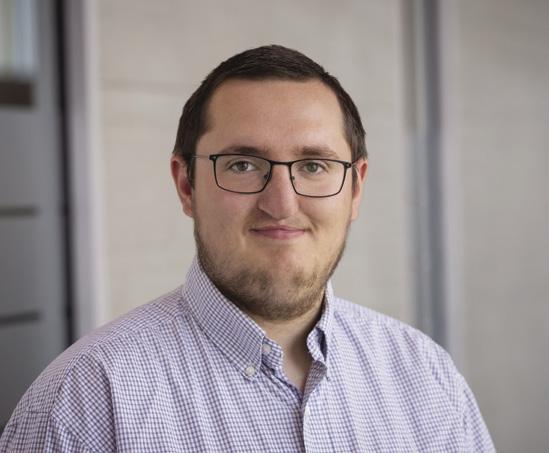
To encourage Lethbridge College employees to take on new projects and develop applied research capacity, the Centre for Applied Research, Innovation and Entrepreneurship (CARIE) funds short-term projects and activities that align with CARIE and college strategic goals and priorities. These projects are often a starting point toward a long-term vision and plan for applied research, including funding from external sources.
Funding for employee projects is provided by grants from the Centre for Applied Research Internal Fund (CARIF), while faculty can also access Social Sciences and Humanities Research Council (SSHRC) Explore and Exchange grants to support small-scale research and related activities to strengthen research excellence and foster the professional development of students. These grants are core components of FITS, CARIE’s strategic framework for expanding applied research by fostering, identifying, targeting and sustaining research projects. In 2023-24, CARIE is overseeing three SSHRC Explore grants, one SSHRC Exchange grant, and seven CARIF grants.
Ethical Decision-Making for Public Safety Applicants – Dr. Kirsten Fantazir and Dave Maze. This project aims to develop a pilot interactive virtual reality scenario to assess the ethical decision-making capabilities of potential public safety applicants with the support of a student research assistant. Read more about this project on page 11.
Engaging Youth in Public Safety – Dean Kolebaba and Gord Ryall. This project explores youth engagement and recruitment strategies with police services and departments in British Columbia, Alberta, Saskatchewan and Manitoba. The purpose is to foster student involvement in applied research and provide direction to small- and medium-sized public safety agencies that would like to implement their own youth cadet programs. Read more about this project on page 15.
Studying the Transition from Civilian to Police Officer – Dr. Jim Urasaki. New police recruits go through an intensely personal process of identity transformation as they go from being regular members of society to taking oaths to protect the public. Dr. Jim Urasaki is researching this new recruit transition process of identity formation and perspective development. Read more about this project on page 14.
Leveraging Technology for Scenario-Based Police Training – Dave Maze and George Gallant. This funding will be used to attend four events to share, through usability testing, the researchers’ proof-of-concept product focused on using VR scenario-based environments to enhance the training of police officers and recruits and to gather feedback.
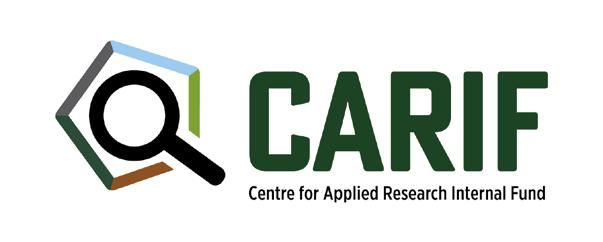

Fish Movement through Beaver Flood Prevention and Beaver Restoration Structures –Kirby England and John Derksen. This project tracks fish passage through beaver flood prevention and restoration structures known as pond levelers and beaver dam analogues. Kevin Brooks, a research assistant on the project, will collaborate on a portion of the dataset to work toward meeting the requirements of his senior project through this study.
Aiming to Assess Ethical Decision-Making Abilities in Public Safety Applicants Through Virtual Reality – Dr. Kirsten Fantazir and Dave Maze. Working with our public safety partners, this project explores if using virtual reality scenarios can enhance or complement the police service hiring processes and agencies’ abilities to assess ethical decision-making capabilities in applicants. Read more about this project on page 11.
Artificial Intelligence Speech to Intent: Enhancing Response Analysis to Improve Presence in VR 360° Scenarios – Stephen Graham and George Gallant. This project will create a new scenario for the Natural Resources Conservation program that uses the prototype system. The long-term vision of this research is to establish modular methods to acquire and retrieve verbal intents from virtual reality (VR) users as a reliable, situational trigger in VR training scenarios.
Automation with Raspberry Pi and Potential Industrial Applications – Shoja Mazidi and Kristine Wilson. This project will focus on developing a Raspberry Pi system to be used in the Aquaculture Centre for Excellence (ACE) to automate fish feeding and pH control of batch bioreactors. With this developed system, ACE will be able to demonstrate a variety of applications to potential industry and research end-users.
Quantification of Arbuscular Mycorrhizal Fungi Associated with Native Plants in Natural and Disturbed Grasslands – Dr. Adriana Morrell. In collaboration with the Nature Conservancy of Canada, this study will provide comparative data on the presence of beneficial fungi associated with representative plant species in natural and disturbed grasslands. It will support senior project research and foster student involvement in mycology and grassland ecology.
Desirable Length of Time for Engaging Clients with Dementia in Preferred Therapeutic Recreation Interventions – Rena Walker and Dr. Karla Wolsky. This research will examine the optimal length of time to engage clients with moderate dementia in preferred therapeutic recreation interventions to meet client outcomes. Research findings may provide some rationale for therapeutic recreation specialists to use when advocating for intervention time and staffing.
Exploring How Police Recruits Form Perspectives About the Job – Dr. Jim Urasaki. This qualitative research project analyzes how police recruits develop their perspectives about the nature of their work and their membership in a police organization. More details on this research can be found on page 14.
Lethbridge College’s Centre for Applied Research, Innovation and Entrepreneurship (CARIE) continues to grow. It has expanded from 10 employees just a few years ago, to more than 70 employees, including research chairs, administrators, managers, post-doctoral fellows, scientists, associates, lab technicians, project coordinators, research assistants and student employees. Here are some of the new people on our growing team:
Applied Research Operations Officer – START Centre and Centre for Public Safety Applied Research (CPSAR)
Anamaria Turuk earned a Bachelor of Fine Arts in New Media from the University of Lethbridge. In her role, she works closely with two centres: START, focused on helping with the development of immersive extended reality experiences through spatial technology; and CPSAR, focused on creating partnerships with Canadian public safety agencies and community organizations to promote evidence-based policies and practices. She says it’s a privilege to be able to work with both research teams to help find solutions for their clients’ pain points. Turuk says, “Seeing real-world change is exciting and it reminds me there is so much potential for the research being done at the college.”
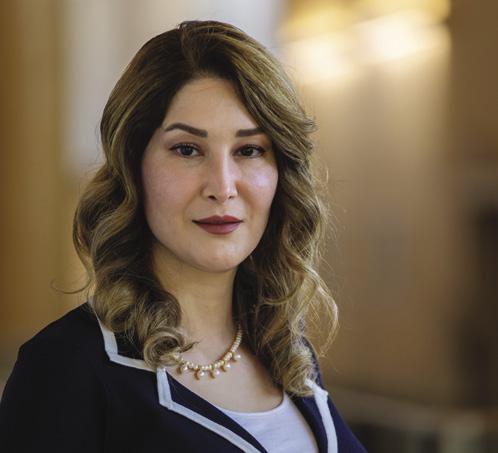
Applied Research Operations Officer – Centre for Applied Research, Innovation and Entrepreneurship
Fariba Karimi says being an Applied Research Operations Officer is both interesting and motivating. She has a master’s degree in Linguistics from the Islamic Azad University Isfahan Khorasgan Branch (khUISF) and a bachelor’s degree in English Teaching from the Islamic Azad University Isfahan Najafabad Branch (IAUN), as well as a Business Administration-Accounting diploma from Lethbridge College. She has been with the CARIE team since November 2022.
Applied Research Operations Officer – Agriculture, Food and Environment
Dr. Leslie May supports research projects in the Advanced Post-harvest Technology Centre and Mueller Irrigation Group. Leslie earned her Ph.D. in Chemistry from the University of Calgary and held an industrial postdoctoral position with a global oilfield service company, where her research focused on oil pipeline corrosion issues and the mitigation of sulfur deposition and sulfur-related corrosion in sour gas fields. Leslie joined the college in May 2023, and she looks forward to what her future holds with the CARIE team.
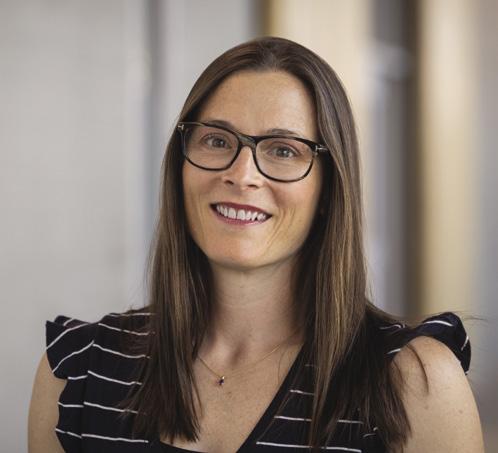
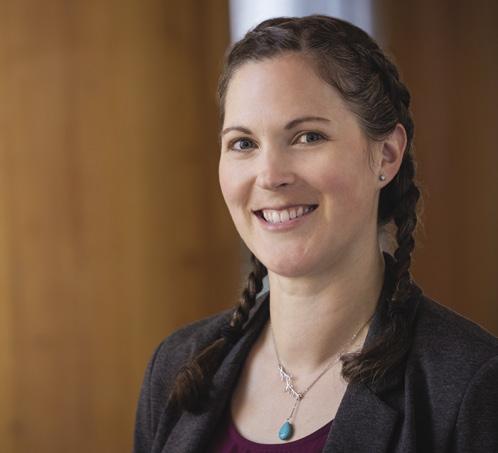
Coordinator – Research Ethics Board and Animal Care Committee
Information Services Specialist – Buchanan Library
Constance Sheriff has a Bachelor of Arts from the University of Guelph and an Individualized Multidisciplinary Master of Arts from the University of Lethbridge. In her coordinator roles, she facilitates processes for the Research Ethics Board (REB) and Animal Care Committee (ACC), acting as a liaison between researchers seeking ethical approval for research involving humans or animals and the REB or ACC. She also supports individual research through the Buchanan Library. She says, “The number and quality of innovative applied research projects being conducted is impressive. Lethbridge College employees and researchers are some of the most dedicated, intelligent, and trail-blazing people I’ve met. We are fortunate to have so many talented people here.”
Greenhouse Manager – Centre for Sustainable Food Production
Gregory Holmes is the manager of the greenhouse on campus, known as the Centre for Sustainable Food Production. The 10,000 square-foot facility is home to research projects pursuing ways of growing more food while using less energy, water and other inputs. Holmes joined Lethbridge College in March 2023, bringing expertise in entomology and plant performance, and having earned his bachelor’s and master’s degrees from the University of Lethbridge.
“I love the collaboration and cooperation at Lethbridge College,” Holmes says. “To be a part of research, industry and education is exciting, and I look forward to a brighter future.”
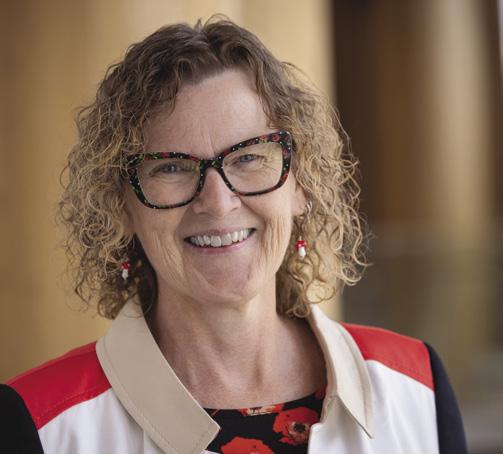
That future includes more affordable fruits and vegetables grown and shipped locally year-round, so he is focused on optimizing greenhouse crop productivity at Lethbridge College.
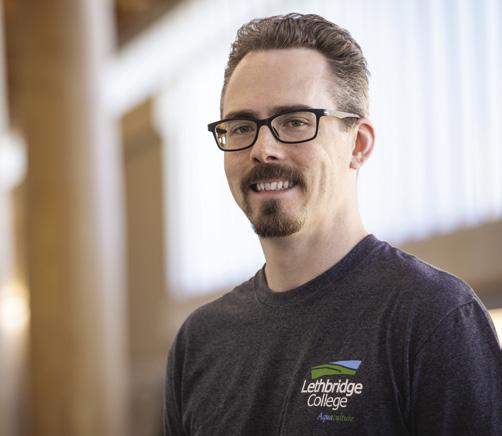
Research Assistant – Advanced Post-harvest Technology Centre
Akshaya Thirulogasundar has a Bachelor of Technology in Food Technology from Anna University in India, as well as a Master of Science in Food Science degree from the University of Saskatchewan. Her undergrad research focused on microbiology and fermentation, while her master’s research covered plant proteins – specifically pulses and protein modification using enzymes. In her role as a research assistant at Lethbridge College, she focuses on quality characteristics of wheat and analysis of sugar content in potatoes. She says she enjoys her work and believes the college’s current research will help farmers and industries resolve common challenges and improve product quality.

The Centre for Applied Research, Innovation and Entrepreneurship (CARIE) encompasses the following research themes:
Lethbridge College has been conducting applied research in agriculture for more than 30 years. Our dedicated researchers and state-of-the-art facilities aim to increase efficiency and productivity for farmers, producers and food processors, improve food safety and security for consumers, and reduce the environmental impact of food production, waste and energy consumption.
Lethbridge College aims to drive our digital economy by paving the way for multiple industries to explore and integrate emerging technologies into their operations to improve business process efficiency, reduce costs and enhance employee safety.
Lethbridge College researchers are helping people and communities thrive, whether it’s through identifying new antibiotic molecules for the prevention and treatment of infectious diseases or using immersive technologies to improve training for health-care workers.
Lethbridge College is an established leader in the field of Justice and Public Safety, with more than 54 years of experience delivering justice, policing and corrections curriculum. Recent events have highlighted the need for proactive global change in the field of Justice and Public Safety, and our industry-focused research projects are at the forefront of sustainable change.
Social Sciences and humanities research focuses on topics that explore a better future by building knowledge about people, cultures and societies that help address today’s challenges and tomorrow’s issues for a sustainable future.
If you have a research project that Lethbridge College can help with, please contact the CARIE offices at 403.320.3202 ext. 5453
appliedresearch@lethbridgecollege.ca
The United Nations’ Sustainable Development Goals are a call to action by all countries – poor, rich and middle-income – to promote prosperity while protecting the planet. As a member in the ImpAct initiative with Colleges and Institutes Canada, Lethbridge College and CARIE engage in campus activities that support the 2030 Agenda for Sustainable Development adopted by Canada and all UN member states in 2015.
LEARN MORE ABOUT THESE GOALS AT: sdgs.un.org/goals
ABOUT THIS PUBLICATION
This is the annual report on progress by the Lethbridge College Centre for Applied Research, Innovation and Entrepreneurship (CARIE). This publication aims to inform, educate and intrigue readers with stories and photos about the people and innovative projects at Lethbridge College. It is created by the college’s Communications, Marketing and CARIE departments. For additional copies, email appliedresearch@lethbridgecollege.ca.
Publisher: Dr. Brad Donaldson
Executive editors: Dr. Kenny Corscadden and Megan Shapka
Co-editors and writers: Cathy Gibson and Lisa Kozleski
Designer: Dana Woodward
Photographers: Curtis Huisman, Tanner Fletcher, Rob Olson and Ryan Robinson







